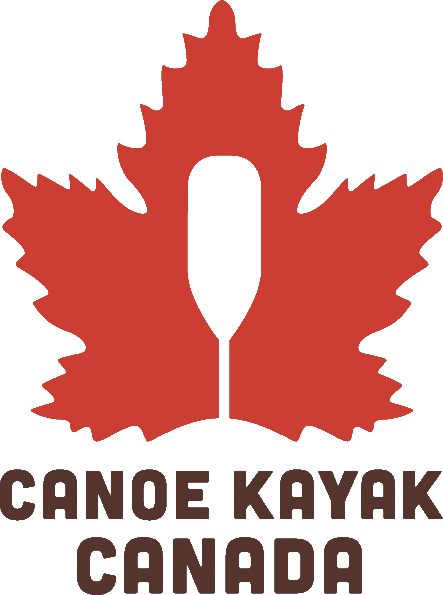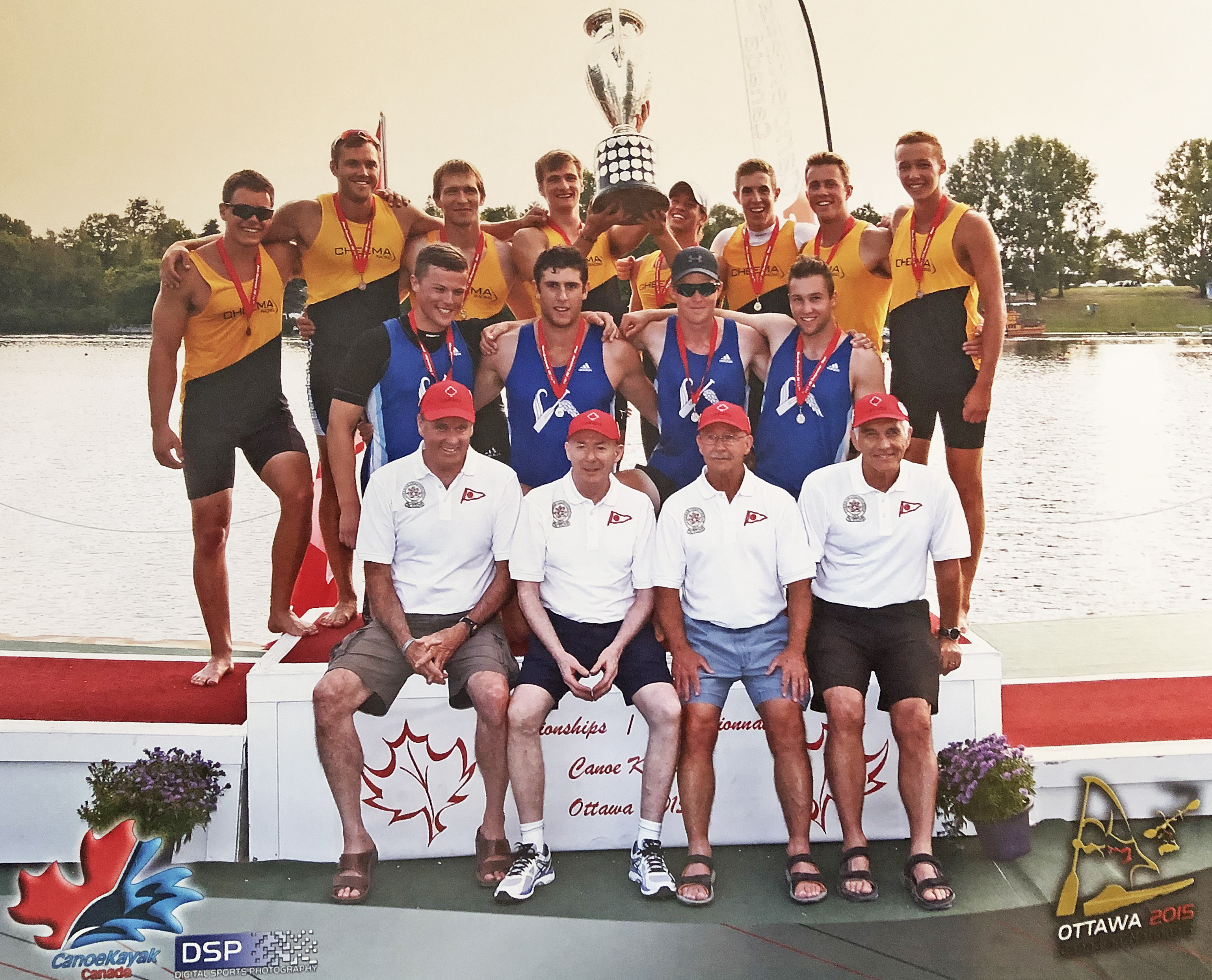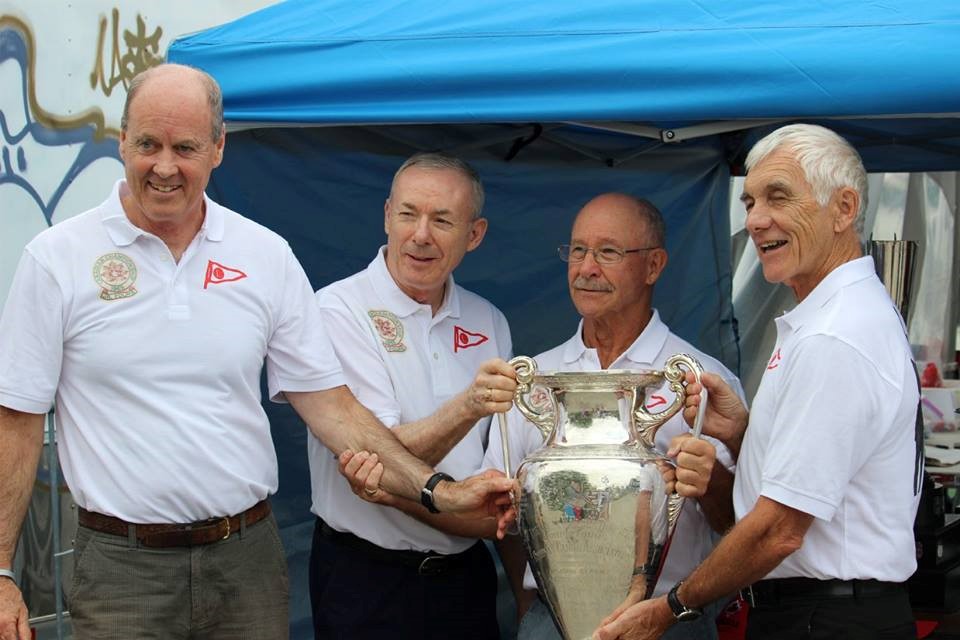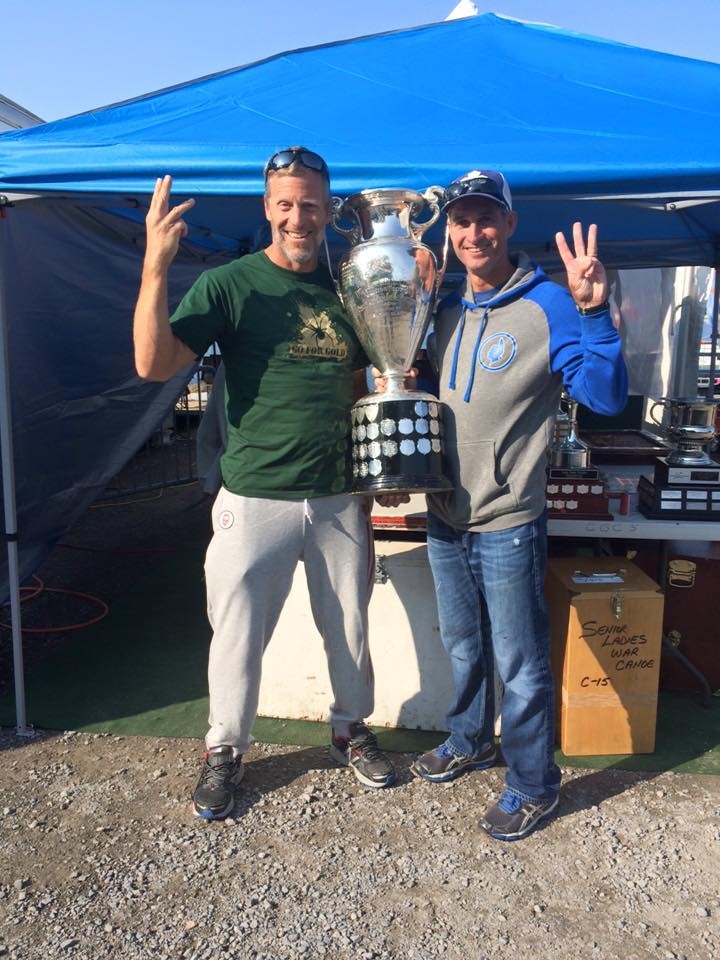
CCA/CKC
Championship Stories
|
||
|
compiled
by Judy Tutty |
||
|
|
||
| Junior Mens C4 1000m | ||
| John
W. Black Trophy Donated: 1928 |
||
| John W. Black Trophy Statistics | ||
| From
“100 Years of Champions”, by C. Fred Johnston “The Black” conjures up images of strong competitive canoe racing in a ‘Canadian’ style C-4 for 1000m. In 2001, “The Black” had major restoration conducted by Birks Jewelers so that it may reflect its luster for another few years. In 2006, it underwent another restoration, with repair and reconstruction of the trophy box. In 2008, additional repairs were done. It is very delicate and the decision was taken to continue to present the trophy at the National Championships but to keep the trophy in the possession of the association between Championships. It is commonly believed to be the largest trophy awarded in North America for amateur sport. The intent is to record the winners and their stories on the CKC and BOC website for all to enjoy. The first call for these stories was made in November 2009; as more stories are contributed, this document will be updated and posted. Contributions
to the Editor: Judy Tutty / judy.tutty@sympatico.ca
/ updated July 2025 |
||
| Time |
Club |
Crew |
||
| 2025 | 4:20.100 |
Senobe |
Nick
Baert (2nd
win; 2019),
Duncan Giles, Liam MacDonald, Michael Zinck |
|
| Welland |
This is the 9th time that a father/son have won the race - Senobe Aquatic Club’s Duncan (2025) and father Steve Giles (1989 - Orenda) |
|||
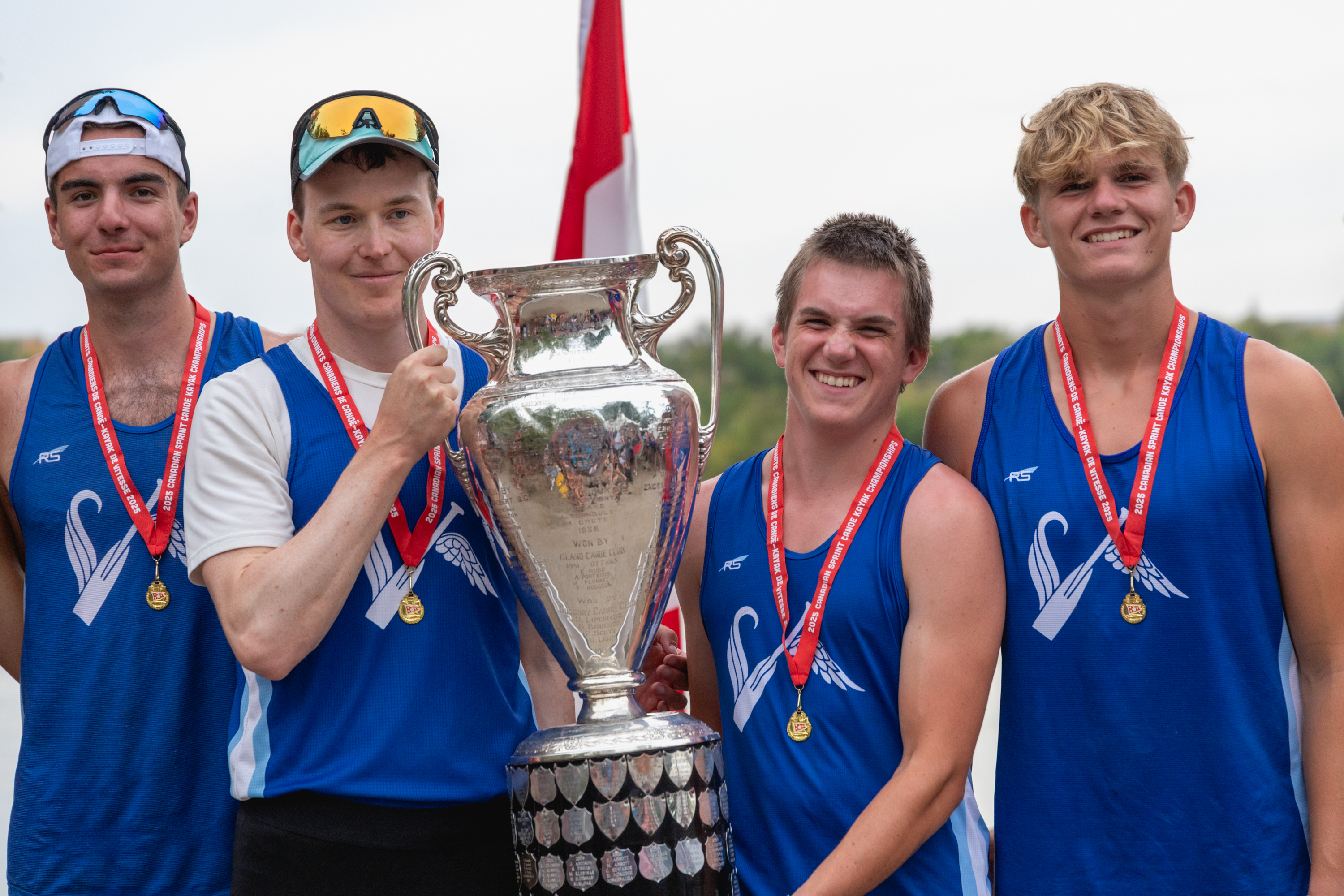 |
||||
| 2024 | 4:22.103 |
Mississauga |
Thomas
Bremerman, Jack Chambers, Lucas Williams, Dylan Schrotter |
|
| Welland |
Proud moment: Bourassa
(Harry and Peter) Rideau The other combinations: Hollins (John 1975, Jon 1993); Sleeth (Bob Sr 1948, Bob Jr. 1972); Oldershaw (Bert 1940, Scott 1971, Mark 2005) |
|||
Derek
Schrotter |
||||
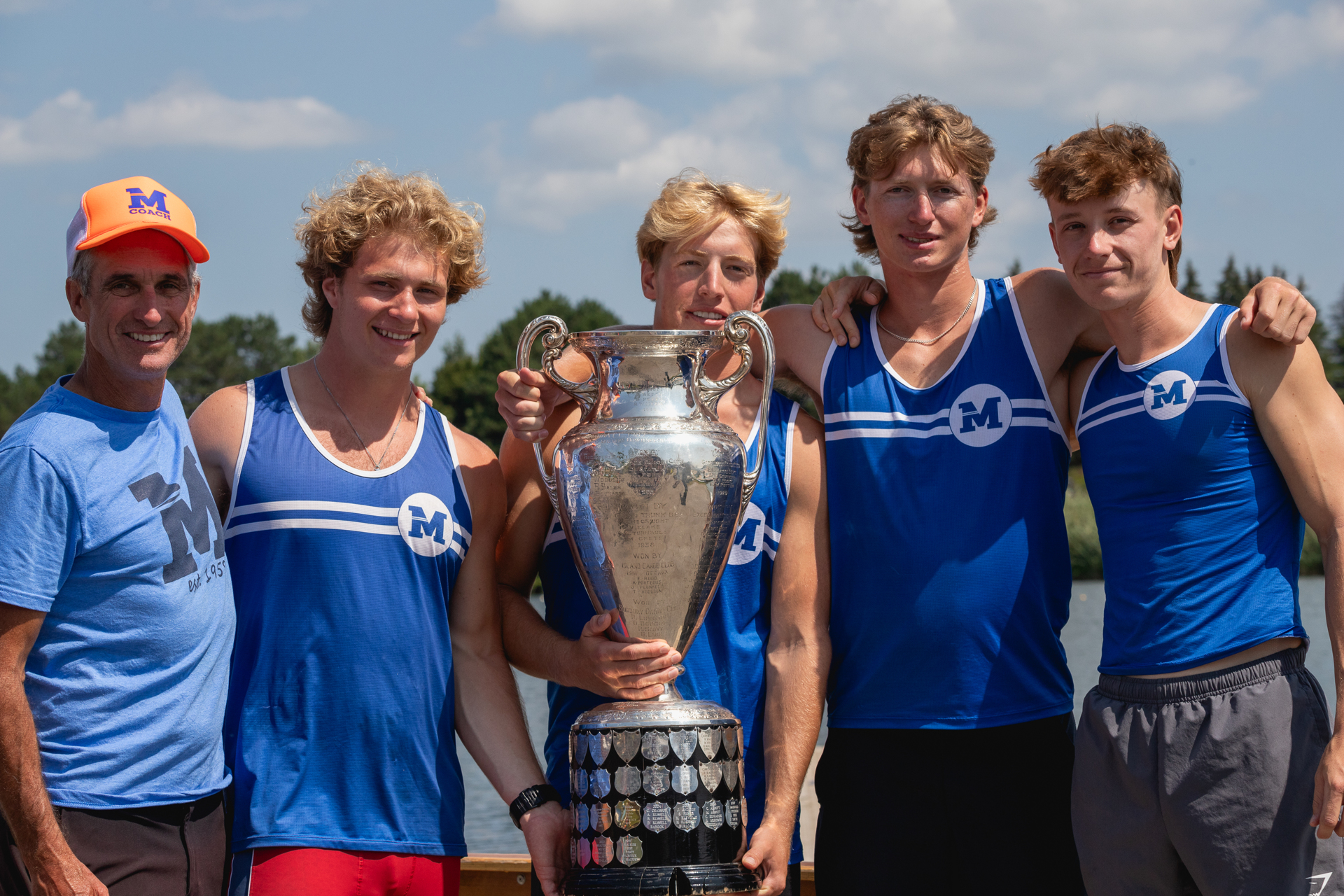  |
||||
| Time |
Club |
Crew |
||
| 2023 | 4:14.098 |
Lac
Beauport |
Édouard
Beaumier, Edgar Désy, Viktor Hardy, Alix Plomteux |
|
| Dartmouth |
It's hard to put into words the emotions that comes with losing a friend like Stephane. We shared countless adventures, triumphs and rivalries, creating memories that we will cherish forever. "The
Black", a race known as the Junior men C4 1000m. A race
that every Canadian canoer dreams of winning. As we prepared for this race, We pictured Stephane in the crowd, capturing moments with his camera and cheering us on. Yet, in reality, he was right there with us in the boat, his presence felt in every stroke, propelling us forward. May his memory live forever in our heart and may this race continue to bring together those who share the passion of the sport. |
|||
Édouard
Beaumier |
||||
| Time |
Club |
Crew |
||
| 2022 | 4:12.844 |
Pointe
Claire |
Elliot
Arnautovich, Émile Bouvier, Jacob Merrill-Arpin, Foster
Salpeter |
|
| Shawinigan |
What a historic event. For the first time since its creation, the trophy of the C-4 1000 m Junior "le black" belongs to the Pointe-Claire Club. |
|||
| 2021 | COVID |
|||
| 2020 | COVID |
|||
| Time |
Club |
Crew |
||
| 2019 | 4:20.604 |
Senobe |
Peter
Lombardi (2nd
win; 2013),
Nick Baert, Connor Fitzpatrick, Jacob Quillan |
|
| Regina |
“The Comeback is Always Better than the Set Back” My quest for the John W. Black trophy started before I truly knew or appreciated what it was I was going after. Junior Men’s C4 for me evolved from being a race I saw as filling out my racecard to being something far more personal, it came to symbolize a race I lost without taking a single stroke. The worst losses are the ones which you deliver to yourself, when it is you who takes yourself out of the race. I’ve fallen victim to letting up in a race before and no feeling is worse when you cross the finish line knowing full well you cheated yourself. A close second to this is when something else takes you out of the race, a broken tee grip, weeds on the rudder, a misapplication of a rule, etc. When you quit, you are left questioning if you could have gone harder here or gone with this person then; when circumstance takes you out of the race or boat altogether it’s the same deal but different. Could I have done what the other paddler who replaced me did or what could have been if x, y and z didn’t happen? You’re no longer left questioning yourself but the things out of your control. Sure, you didn’t quit but you didn’t even have the chance to quit or worse, the opportunity to prove you could rise to the occasion. The window of opportunity to win the Black is fleeting and small and with my lost chance in 2013 I’m happy to say I managed to find another. My first attempt at the Black was Dartmouth Nationals in 2012. I was 17, the crew we fielded was good, but we weren’t contenders for the trophy. We finished 5th and were never in medal contention. My second attempt at the Black was Montréal in 2013. We had the same crew as the year before, but everyone was older and better. This time we had a shot, or should I say my fellow crew members had a shot. To give some context earlier that year I had raced at the Junior World Championships in Welland, Ontario on behalf of Team USA. An experience and opportunity I am incredibly grateful for, not just for the racing but everything that went along with being on team USA that summer. Unfortunately, at that Canadian National Championships, there was ambiguity in the interpretation of phrasing and language of the rule which dictated eligibility to compete at Nationals and how it related to racing for another country internationally. This resulted in CKC booting me from the regatta the day before the event and sanctioning me with an 18-month suspension. This was resolved months later in my favor with the support of my club, through the SDRCC, with an arbitrator removing my ban issued by CKC. This ruling came too late for me though and I was subbed out of the boat. Luckily Senobe was overflowing with so much talent that another skilled paddler in Ian McCormick was waiting in the wings to swoop in and help deliver the dub. Now looking at the result sheet and seeing Senobe winning this race by nine seconds you would think if you subbed in a similarly skilled paddler for one of the guys you would still come away with a victory but for those that have raced this race you will know that’s not the case; with the threat of turning senior these races can be much closer than final times may suggest. Senobe, for instance, was in Mississauga’s wash and had to spike the bow to prevent going out of their lane at one point. Would I have been able to push through the wash and help the crew to a lead resulting in other crews backing off? Without sounding to melodramatic, this is a question I can only ask but can’t answer. To make my point when the guys won I was stoked for them but I couldn’t look at the result and tell myself take Ian and sub me and we would have still got the race. Until you line up and do it you never know if you have what it takes. Part of me selfishly felt robbed of a trophy I didn’t earn or even race for, but a bigger part of me was worried that given the chance I wouldn’t have been good enough to help win it. The missed opportunity that was this event underscored the frustration and embarrassment I felt at the 2013 Nationals as I was relegated to sitting on the sidelines. I didn’t care about waiting for the perfect storm and lining up a golden opportunity to win it, I just wanted a chance to go out there and send it. I would have my chance to do just that for the 2015 National Championships in Ottawa. My crew looked much different from its earlier iterations with myself, Ben Firth, Connor McGregor and Colin O’Neil helming the boat. To give some context to this showdown that was the Junior C4 race this year no one in our boat had made a Junior singles final at Nationals compared to the stacked Cheema crew with multiple guys who had raced internationally for Canada. It didn’t matter though. We lined up treating this race like we had a chance to win and went for it. We fought the entire way down the racecourse, beating Cheema, the B crew that is. The Cheema A crew trounced us. Anytime you can medal at Nationals though is an accomplishment and we earned that finish and won second. No one in our boat considered sitting up and coming third because we were too busy trying to cross the line. We went into that race with the mindset that we could come out winners and lost to a great crew. Turning senior for four years seemed liked a small price to pay, in my eyes, for a chance to prove to myself I could compete in that race. I knew I’d be around for another shot at the top of the podium and getting to stand so close to it after that race just made me want it more. Four years went by and I found the pieces begin to fall into place in the summer of 2019 for another attempt. I would now revert back to Junior status in Junior Men’s C4. This time we had Connor Fitzpatrick, a National team paddler who had competed at the Senior World Championships in C2 this same year, Peter Lombardi a seasoned club paddler who had won the Black in 2013 and had put a full year of training in and Jacob Quillan, an athlete primarily focused on Hockey but still a talented Juvenile paddler who showed up every summer, put in good work and always came to Nationals prepared. Fast forward to the National final in Regina, we were Lane 5 and went into it knowing after the heats that it was us or Mississauga. For most of the race we sat back within striking distance of Missy. Staying in contention through the middle while being efficient was the focus but admittedly I was worried that Missy had us by a boat going through the 500. We started to pick up the pace though, and knew we wanted to settle it earlier rather than later. The outcome of the race was then determined at the 250m mark. We had chased Missy down and made our move, Peter called for an up and we shifted gears into race pace. In response Missy made a move and they fought to hold their lead, following this Peter yelled for a second up and we sent it. We surged past Missy and they fought to hold on going through the 200 but we were moving, and no one was letting up in our boat. We finished the race with a 10 second win over second. A fitting parallel to Senobe’s dominant win in Montréal six years previous. Six years previous I was left wondering had I been in the boat if Senobe would have won or even pulled off its nine second win and six years later I got as close to answering that question as I think I will ever get with my own 10 second win. |
|||
Nick
Baert |
||||
| Time |
Club |
Crew |
||
| 2018 | 4:19.097 |
Mississauga |
Sean
Barich (2nd
win; 2014),
Jack Tutty, Evan Bezemer (2nd
win; 2014), Philipe Turcanu |
|
Sherbrooke |
|
|||
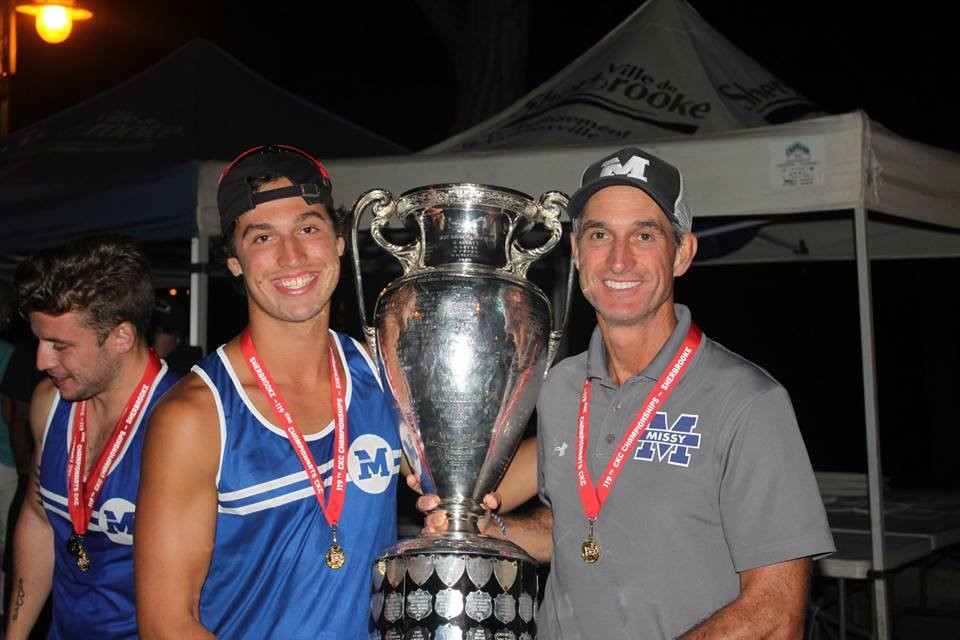 Editor’s note: Fifth father/son win – Doug Tutty, Mississauga, 1987. First for repeat champion and son; second for a father and son representing the same club: Doug Tutty first to win The Black 3 times (1987, 1997, 2003). |
||||
| Time |
Club |
Crew |
||
| 2017 | 4:11.936 |
Lachine |
Simon
Coallier-Morissette, Thomas Cote David Provost, Nikolas Fabreau-Regimballe |
|
| Welland |
They saved the best for last – the Junior Men’s C-4 1000m – the final race on Day 4 at the Canadian Sprint Canoe Kayak Championships. For the hundreds of fans at the Welland International Flatwater Centre, it was a thrilling wrap-up to another jam-packed day of elite paddling. Decided
by only a few seconds, the first place prize – and the
John W. Black Trophy – went to the Lachine Canoe Club,
with the Maskwa Aquatic Club in second place, and the Mississauga
Canoe Club in third. It’s the first time since 1979 that
Lachine has won the Black Trophy, which is the most iconic prize
to be awarded at the National Championships. |
|||
CKC
Website |
||||
| Time |
Club |
Crew |
||
| 2016 | 4:14.968 |
Burloak |
Mark
Klevinas (3rd
win; 2005/2012),
Paul Bryant, Sam Pennyfather, Brady Reardon |
|
| Dartmouth |
|
|||
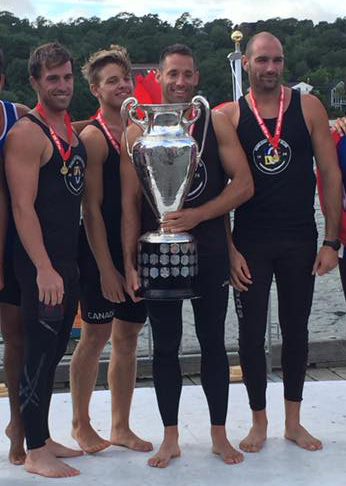 |
||||
| Time |
Club |
Crew |
||
| 2015 | 4:16.180 |
Cheema |
Thomas
Hall, Peter Korisanszky, Peter Lakner, Craig Spence |
|
| Ottawa |
|
|||
|
||||
| Time |
Club |
Crew |
||
| 2014 | 4:24.492 |
Mississauga |
Lee
Barich, Sean Barich, Evan Bezemer, Drew Gildner |
|
| Regina |
|
|||
- Doug
Tutty |
||||
| Time |
Club |
Crew |
||
| 2013 | 4:17.307 |
Senobe |
Peter
Lombardi, Mark James, Jack Leahy, Ian McCormick |
|
| Montreal |
|
|||
| Time |
Club |
Crew |
||
| 2012 | 4:13.552 |
Burloak |
Mark
Oldershaw (2nd
win; 2005),
Mark Klevinas (2nd
win; 2005),
Jamie Andison (2nd win; 2005), Jeremy Stott |
|
| Dartmouth |
|
|||
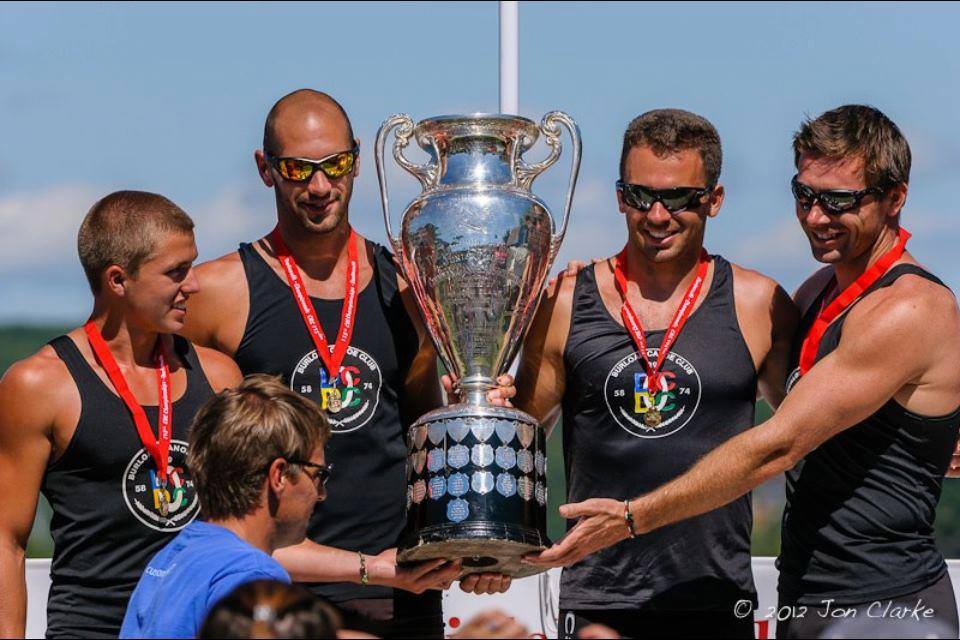 |
||||
| Editor’s note: Fourth father/son win – Kevin Stott, Burloak 1993, Mississauga 1997. First for a father and son representing the same club. | ||||
| Time |
Club |
Crew |
||
| 2011 | 4:22.758 |
Rideau |
Ian
Mortimer (2nd
win; 2001),
Ian Acelvari, Cameron Marcus, Ben Tardioli |
|
| Welland |
|
|||
| Time |
Club |
Crew |
||
| 2010 | 4:16.210 |
Burloak |
Larry
Cain (3rd
win; 1981, 2000),
Evan Smith, Cory Rublee, Aaron Rublee |
|
| Regina |
|
|||
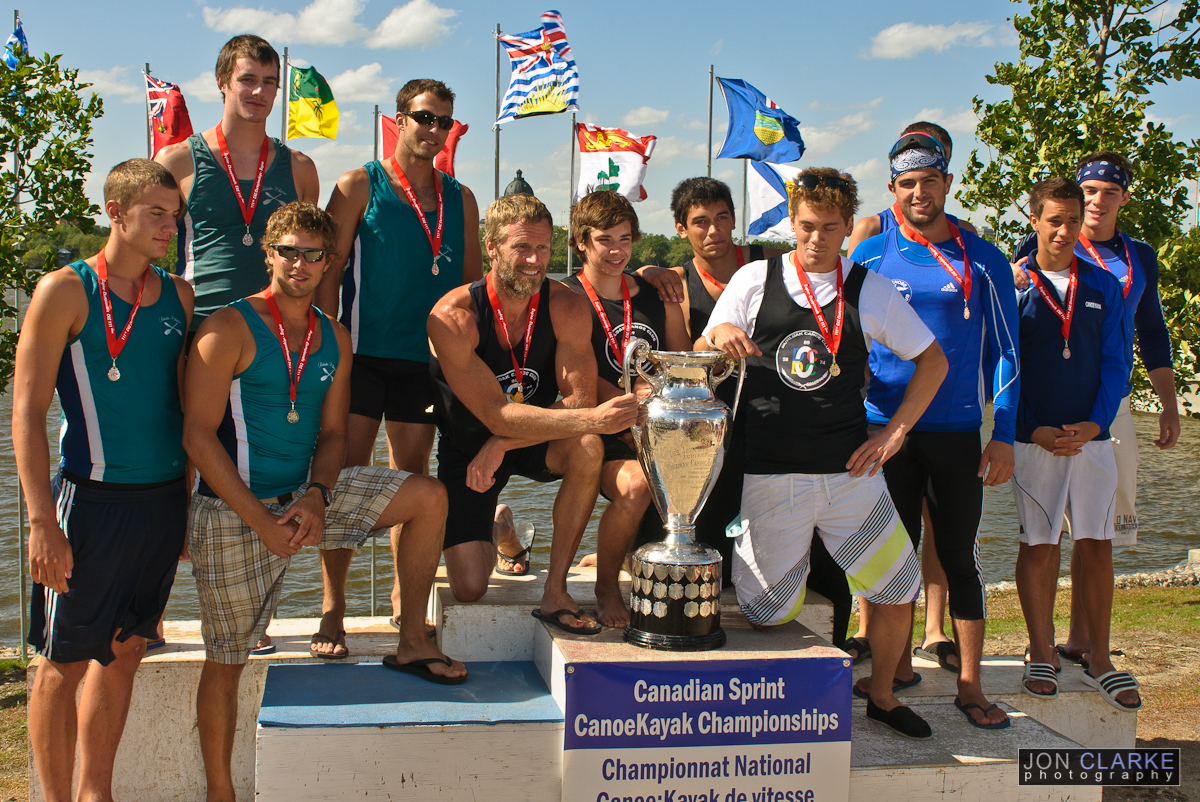 |
||||
| Time |
Club |
Crew |
||
| 2009 | 4:40.866 |
Burloak |
Chris
Andison, Sam Roworth, Ryan Stepka, Thomas Thrall |
|
| Sherbrooke |
|
|||
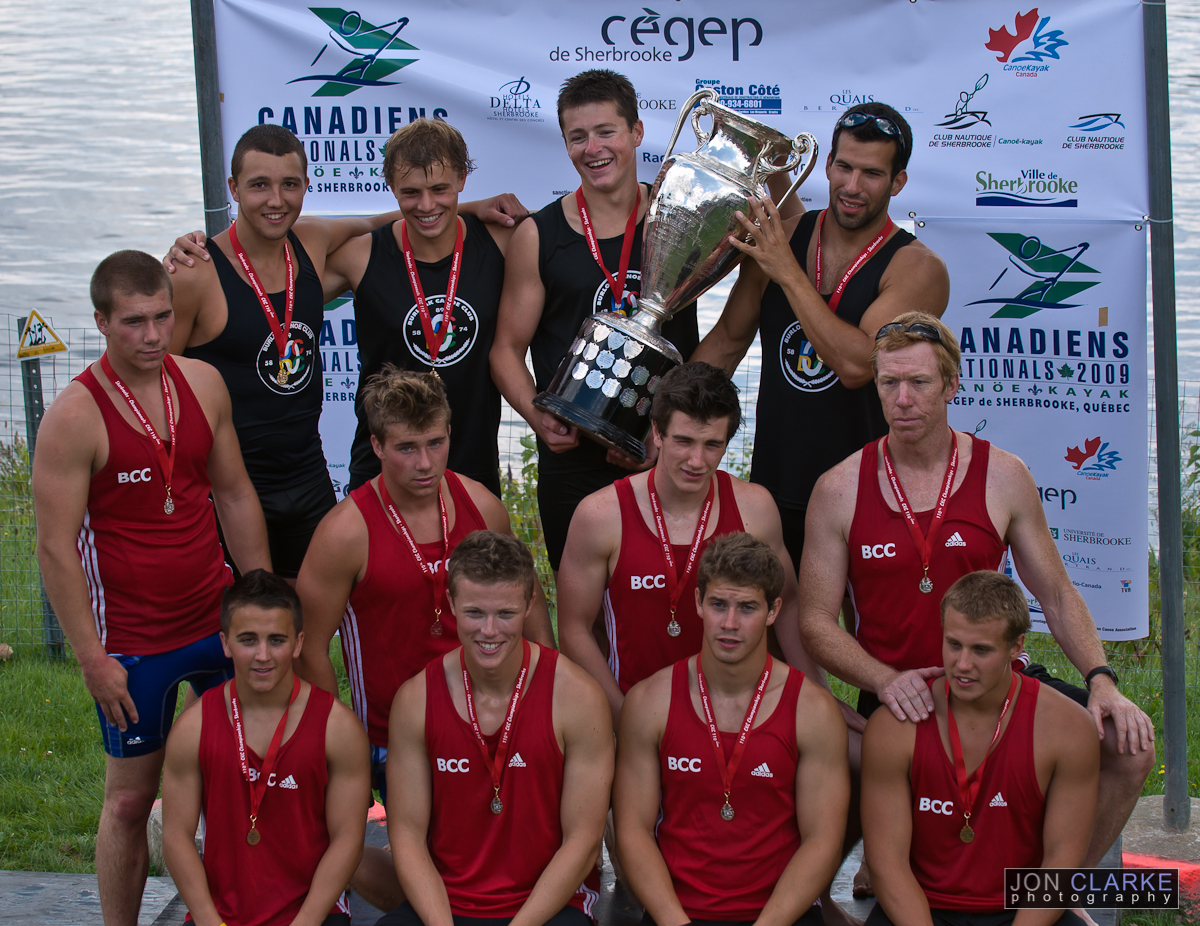 |
||||
| All except Thrall are kayakers... | ||||
| It all started out with four names on the crew selection board under Junior Men C-4 ... three lefts and one right (Sam, Thom, Chris, Adam Oldershaw). After much debate, Ryan decided to move his name from another crew and try his skills in the infamous C-4 race. This resulted in Adam taking his name off the list and a full crew being made with a little difference from any other Junior Men C-4 crew, three kayakers and one canoer (and a kayaker steering!). From that moment there would be some joking around between the crew and by other members at Burloak ... no one expected what was to come! A little over a month before Nationals the crew began to practice. The first practice was fun and we realized that we could make the boat run fairly smoothly. We only had a couple of practices before WOD trials to get as good as possible to qualify the boat. To our surprise, we ended up winning and receiving “snowballs”. Woohoo! All of the Burloakers who were watching from the shore said we looked really good and our coaches, Larry Cain and Adam Oldershaw were amazed how well the boat was moving. From then on we decided to take this a little more seriously and start perfecting our technique in the tubby boat. Every time we took to the water in the C-4, we would discuss amongst ourselves and with our coaches and fellow paddlers what worked and what did not. The ability to discuss and take tips from others was definitely the most valuable skill that the crew had and the reason we kept improving each practice and race. The next race was Ontario Championship where despite trying to find a boat at the last minute, paddling with buns, Thom's block holder breaking (sorry Missi) midway through the race, and oh yes being behind at the halfway mark, we still manage to win by five seconds. At this point we were starting to think that maybe we had a chance to do well at Nationals, so we trained even more and made sure to take every bit of advice from all our coaches. Next up, Nationals! Leading up to the heat, there was the normal goofing around by Sam, Thom and Chris, but not so much by Ryan because he was trying to calm the other guys down (also referred to by some Burloakers, whose names won't be mentioned, as being a tight-ass). On the line we were ready to go and especially ready to improve on our start, something that the crew had been working on the most. We had our best race start to date and managed to lead most of the race and win. After our race, we watched the other heat since the Banook “A” crew was coming down. We knew that they were going to be good and they looked that way as well. When the results came up, we were pretty surprised to see that we had the best time overall ... this is when it finally clicked that we had a shot at winning. The next day and the day of the race, it really seemed like the only person that was nervous was Ryan because the other guys continued to joke around and act like normal. When it came time to prepare the boat for the race, it was nothing new ... finding Thom to get his things together. The crew could deal with that, but that wasn't even the worst. First, he had to go to the washroom right before we needed to bring the boat down to the dock and after we had our pep-talk with Larry, he said he needed to go again. Ryan and Larry were noticeably frustrated and Larry just said hold it in or go out the side of the boat when you are at the top. We get to the top and Thom really needs to go but doesn't want to go out the side of the boat so we had to stop at a dock, which was at the start line luckily. We thought everything was going to be fine from then on, but surprise ... Thom was turned around trying to fix his foot piece. Apparently, it wasn't fully attached, but there was nothing he could do since we were all set up. So Sam tightened it as much as possible and told Thom to put his foot in a specific place where the foot piece wouldn't move as much. At this point, it was about five minutes to start and Ryan was really nervous because of all this. We approached the line at one minute to start and Chris lets one rip ... a calm was felt by everyone and we were ready to go. We nailed our start, but still managed to be behind the Banook “B” crew, who we beat in the heat and apparently there were other teams ahead too. Despite this, we stayed focused and kept making up ground on everyone. At the halfway point, we were just even with Banook “B” and maybe even ahead. It was a tight race the whole way between us and both Banook crews, especially the first half, but we knew we got stronger the second half. At the 200m mark, all that was heard in the boat was Ryan yelling “I want this so ******* bad” and with that, everyone dug a little deeper and the boat took off. In the last 200m we gained 3 seconds on both Banook crews as we heard the crowd roaring. At the end of the race, with a little bit of open water, the celebrations began and so did the shock of us winning, felt by the crew, fellow Burloakers and so many others who were at Nationals in Sherbrooke, Quebec. Thom must have felt it the most because he fell back into Sam and the boat tipped, ruining Chris' wicked celebration pose which was the ultimate “Gun Show”. The celebrations continued in the water and included Sam losing his Oakley sunglasses. We finally got picked up from the water in a luxurious Seadoo safety boat.
The only thing left was for us to get our medals and the The Black
trophy ... but wait, only on the podium? Apparently 2009 has been
decided as the first year of change. The Black Trophy will no
longer be given out to winners which ends an 80-year old tradition.
So, the Burloak crew will not have the trophy to prove their accomplishments,
just the small National Championship medals. Even without receiving
the trophy to celebrate and fill full of beer, the euphoria and
feeling of accomplishment that comes with winning the “Stanley
Cup of Paddling” will last forever. Luckily two of us are
in Ottawa and can visit it when we want ... or pull a Canadian
job, in theatres next year featuring Chris Andison and Ryan Stepka. |
||||
Sam
Roworth |
||||
| Time |
Club |
Crew |
||
| 2008 | 4:11.925 |
Toba |
Cameron
Hunter, Jerome Seremak, Andri Shchudlo, Tom Sherwin |
|
| Dartmouth |
|
|||
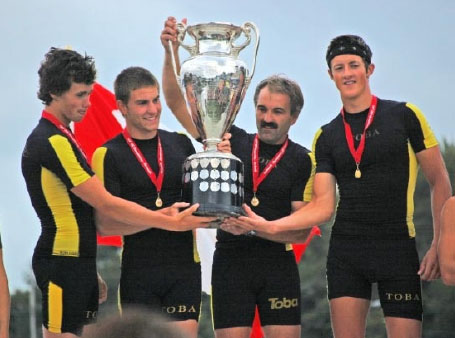 |
||||
| Time |
Club |
Crew |
||
| 2007 | 4:19.031 |
Cheema |
Todd
MacDonald, Jon Pike, Andrew Pickrem, Isaac Smith |
|
| Ottawa |
|
|||
| Time |
Club |
Crew |
||
| 2006 | 4:10.808 |
Mississauga |
Christopher
Abbott, Matthew Abbott, Chris Edwards, Dana Morgoch |
|
| Regina |
|
|||
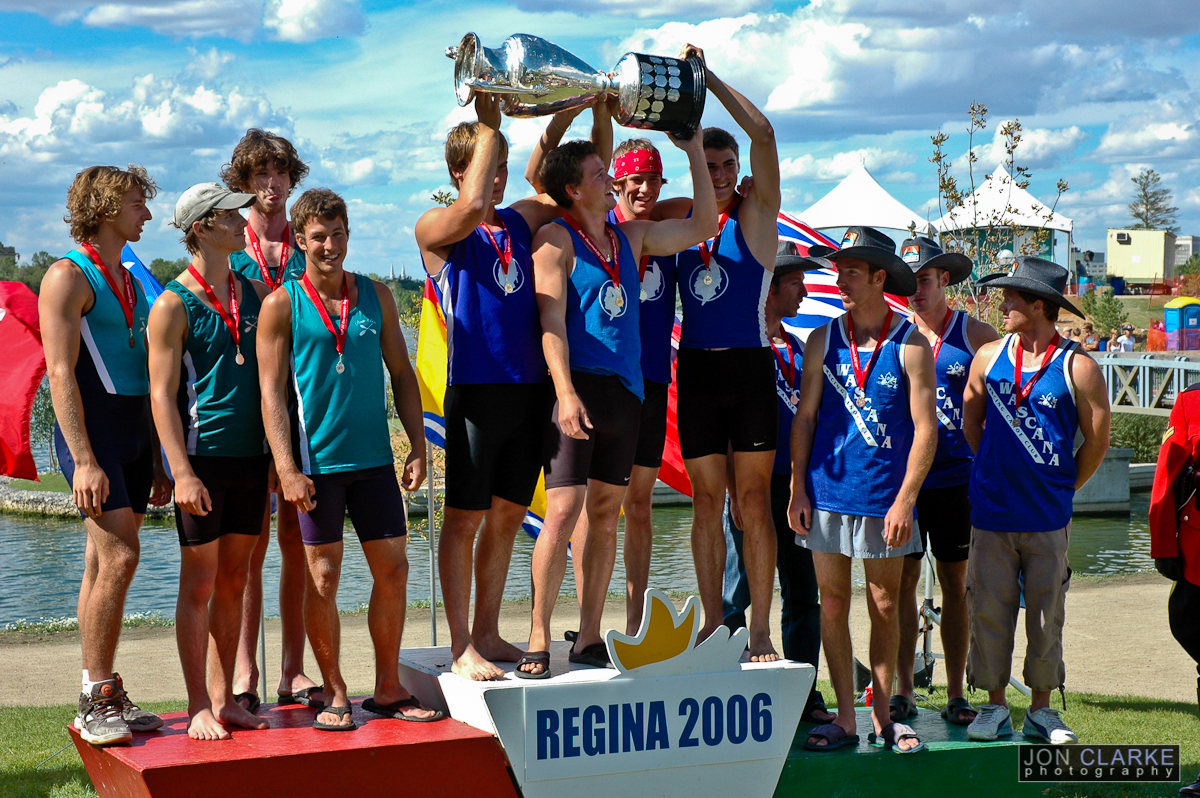 |
||||
| Time |
Club |
Crew |
||
| 2005 | 4:09.987 |
Burloak |
Mark
Oldershaw, Mark Klevinas, Jamie Andison, Scott Fisher |
|
| Montreal |
First third generation – Bert Oldershaw, Island 1940; Scott Oldershaw, Quebec 1971. |
|||
| Current
Record |
||||
| Time |
Club |
Crew |
||
| 2004 | 4:19.031 |
Banook |
Andrew
Russell, Ben Russell, David Russell, Chris Chaisson |
|
| Dartmouth |
|
|||
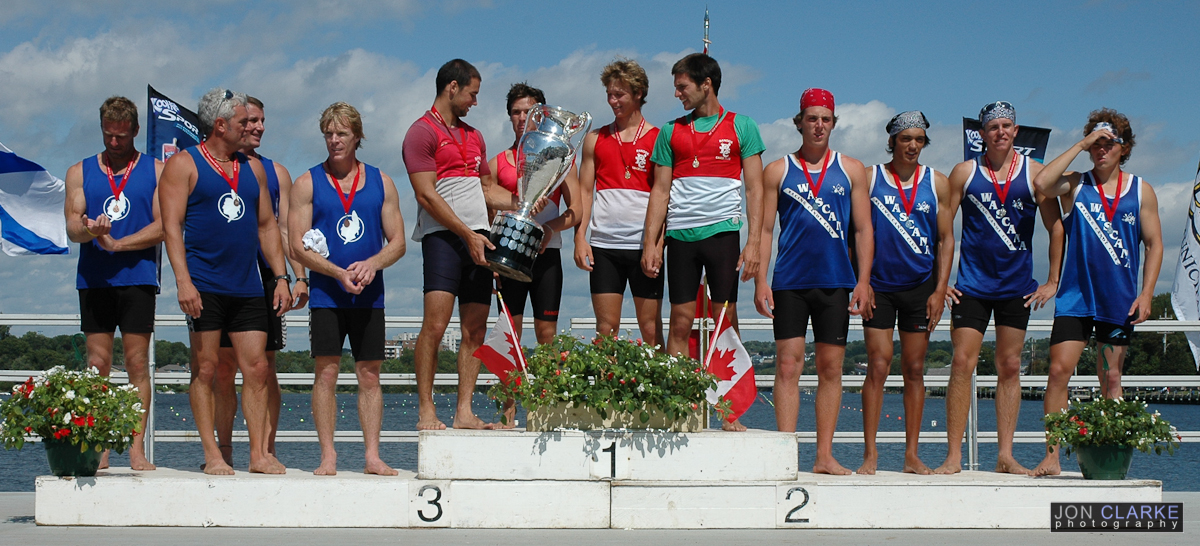 |
||||
| Time |
Club |
Crew |
||
| 2003 | 4:19.031 |
Mississauga |
Doug
Tutty
(3rd
win; 1997, 1987),
Jason Roussel
(2nd
win; 1999),
Duke Ruzicic, Jeff Daniels |
|
| Welland |
|
|||
| Time |
Club |
Crew |
||
| 2002 | 4:29.090 |
Cap-de-la-Madeleine |
Dave
Frost (2nd
win; 1998),
Pierre-Philippe Normand (2nd
win; 1998),
Maxime Hamelin, Gabriel Beauchesne-Sevigny |
|
| Minnedosa |
|
|||
| Time |
Club |
Crew |
||
| 2001 | 4:12.271 |
Rideau |
Ian
Mortimer, Matt Higgins, Mark Seaby
(2nd
win; 1994),
Scott Seaby |
|
| Lac
Beauport |
|
|||
Best
Time |
||||
| Time |
Club |
Crew |
||
| 2000 | 4:31.318 |
Burloak |
Larry
Cain (2nd
win; 1981),
Dennis Coghlin, Michael Oryschak
(2nd
win; 1991),
Chris Stringer |
|
| Dartmouth |
|
|||
| Time |
Club |
Crew |
||
| 1999 | 4:16.84 |
Mississauga |
Kyle
Jeffery, Jason Roussel, Ian Howes, Louis Muto |
|
| Ottawa |
|
|||
| Time |
Club |
Crew |
||
| 1998 | 4:26.31 |
Cap-de-la-Madeleine |
Dave
Frost, Pierre-Philippe Normand,
Alexandre Lajeunesse, François Bernier |
|
| Whistler |
|
|||
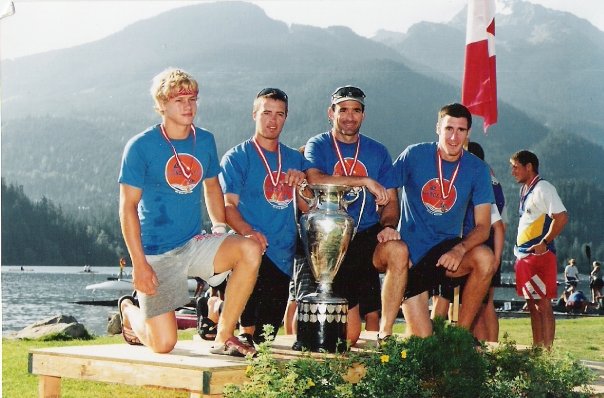 |
||||
| Time |
Club |
Crew |
||
| 1997 | 4:32.01 |
Mississauga |
Doug
Tutty
(2nd
win; 1987),
Kevin Stott (2nd
win; 1993),
Blake Hara
(2nd
win; 1990),
Derek Schrotter |
|
| Montreal |
|
|||
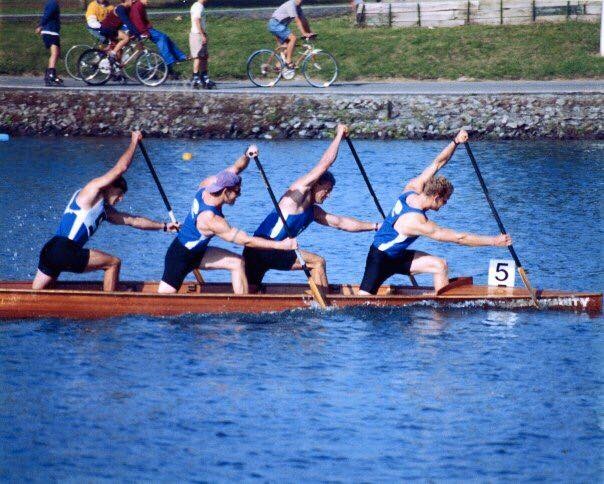 |
||||
| Time |
Club |
Crew |
||
| 1996 | 4:27.41 |
Lac
Beauport |
Sean
Cannon, Patrick Norbert, Maxime Boilard, C. Moreau |
|
| Dartmouth |
|
|||
| Time |
Club |
Crew |
||
| 1995 | 4:12.91 |
Cheema |
Lee
Cluett, André Pellerin, Ken McIntosh, Mike Scarola |
|
| Welland |
|
|||
| Time |
Club |
Crew |
||
| 1994 | 4:35.75 |
Rideau |
Peter
Niedre (2nd
win; 1990),
Kevin Marler, Mark Seaby, Ivan Charalambij
(2nd
win; 1977) |
|
| Montreal |
|
|||
Editor’s
note: Rideau also won the E. R. Reilly Trophy (Juvenile) aka The
Baby Black |
||||
| Time |
Club |
Crew |
||
| 1993 | 4:12.82 |
Burloak |
Rob
Stott (2nd
win; 1986),
Kevin Stott, Brian Bliss (2nd
win; 1980),
Jonathan Hollins |
|
| Ottawa |
|
|||
Best
Time |
||||
Editor’s note: Third father/son win: John Hollins Sr. (Balmy Beach 1975) |
||||
| Time |
Club |
Crew |
||
| 1992 | 4:35.4 |
Banook |
Albert
McDonald, Trent Waterhouse, Matt Patterson, Carl Francis |
|
| Dartmouth |
|
|||
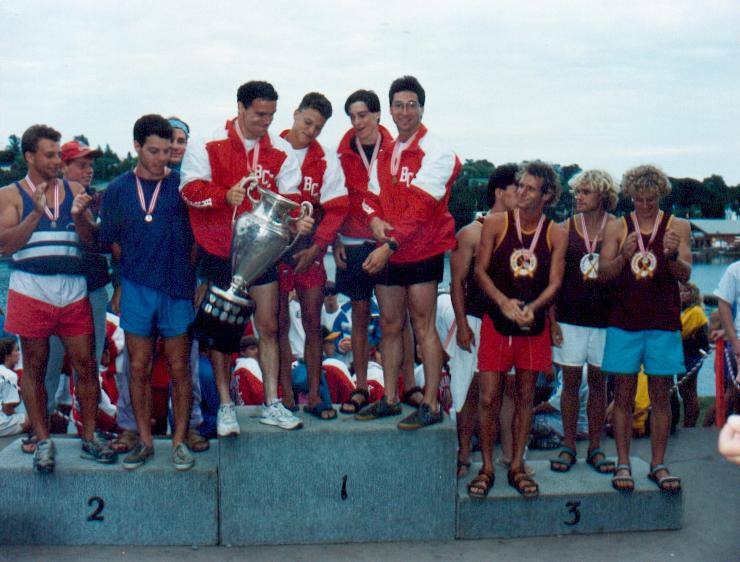 |
||||
| Time |
Club |
Crew |
||
| 1991 | 4:20.54 |
Mississauga |
Michael
Oryschak, Attila Buday, Nigel Smedmor, Eric Weiss
(2nd
win; 1987) |
|
| Ottawa |
|
|||
Editor’s
note: Mississauga also won the E. R. Reilly Trophy (Juvenile)
aka The Baby Black |
||||
| Time |
Club |
Crew |
||
| 1990 | 4:18.101 |
Mississauga |
Blake
Hara, Greg Secko, Peter Niedre, Paul Pageau |
|
| Montreal |
|
|||
Editor’s
note: Mississauga also won the E. R. Reilly Trophy (Juvenile)
aka The Baby Black |
||||
| Time |
Club |
Crew |
||
| 1989 | 4:16.661 |
Orenda |
Bryan
Burns, Glen Girard, Steve Giles, Kevin Mullen |
|
| Montreal |
“The Day I Won The Black” So, my brother Peter and Bryan Burns had a look at the 1988 Black Trophy Story and decided that the story really was incomplete without an epilogue on what happened the next year. With that in mind, here is a guest post (with a few minor edits from me) from my team mate Bryan Burns who, even though he was a giant, stroked the boat like a master. … by Steve Giles The following year, Nationals were in Montreal and we were again the favourite crew to win The Black, though, undoubtedly many people wondered what might become of our fated crew this year. Steve Giles was ill (suffering from mono? kissed too many Russians on tour?) and was unable to compete in singles events at the Championships, but with some encouragement, agreed to take another swing at winning The Black. [Actually, Bryan, I had been suffering from some kind of stomach ailment all week and had indeed dropped out of all my other races – the fact that I had kissed too many Russians on tour is completely unrelated. What does it say about the power of The Black Trophy that I was not willing to give up the chance to win even though I had not really eaten for days? … Steve] Unlike in 1988 in Dartmouth where the massive headwind created hectic conditions, this year the conditions in Montreal were, as is often the case, fair and with no wind or the possibility of a tail wind. We had the opportunity to redeem ourselves and, possibly establish a new record, but more importantly, stay afloat. I remember virtually carrying Steve down to the boat and him not paddling much on the way up to the line before the start of the race. We didn’t do much warming up. Despite the favourable, flat conditions, we were all a little nervous about any possibility of a repeat performance. The race started and we took a lead from the beginning and we were focused on making the boat ride as smoothly as possible. I remember looking over and being ahead of the other crews, growing our lead a bit of a lead coming into the 500m mark. At the 500m, there was some conversation in the boat, a check on the water level. I said “let’s go for it” and we upped our power and rate to take a greater lead, not worrying as much about the possibility of water in the boat. We finished and were a lot less tired than the year before as well as having broken the record set by Oakville’s crew of Larry Cain, Scott Logan, Al Thomson and Peter Koschanow eight years earlier. With victory finally in our hands, The Black Trophy returned to an Atlantic Canada for the first time in 33 years. Not since Mic Mac’s victory in Ottawa in 1956 had an Atlantic Canadian crew won the trophy. … Oh, one more thing – Bryan – with a “Y”. [oops – sorry – Steve] … |
|||
Best
Time |
||||
Bryan
Burns |
||||
The
worst part was that I was so sick I could not even have a beer
from The Black. But my name is on the trophy and I share a bond
with three guys that can never be taken away. … |
||||
Steve
Giles |
||||
| Time |
Club |
Crew |
||
| 1988 | 5:09.623 |
Cartierville |
André
Croteau, Lambert Poirier, Bob Kay, Brian Norris |
|
Dartmouth |
“The
Day I Almost Won The Black” |
|||
Steve
Giles member of Orenda crew |
||||
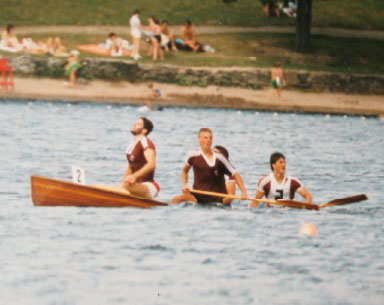 
|
||||
| Time |
Club |
Crew |
||
| 1987 | 4:21.08 |
Mississauga |
Doug
Tutty, Max Tracy, Brian McNeil-Smith, Eric Weiss |
|
| Calgary |
|
|||
| Time |
Club |
Crew |
||
| 1986 | 4:23.41 |
Mississauga |
Rob
Stott, Stephen Smith, Ron Wright
(2nd
win; 1982),
Doug Perry |
|
| Toronto |
|
|||
| Editor’s note: Mississauga also won the E. R. Reilly Trophy (Juvenile) aka The Baby Black | ||||
| Time |
Club |
Crew |
||
| 1985 | 4:30.812 |
Rideau |
Bruce
Raymond
(2nd
win; 1974),
Dave Joyce (2nd
win; 1974),
Tom Hoferek, Tim Hodgson |
|
| Ottawa |
|
|||
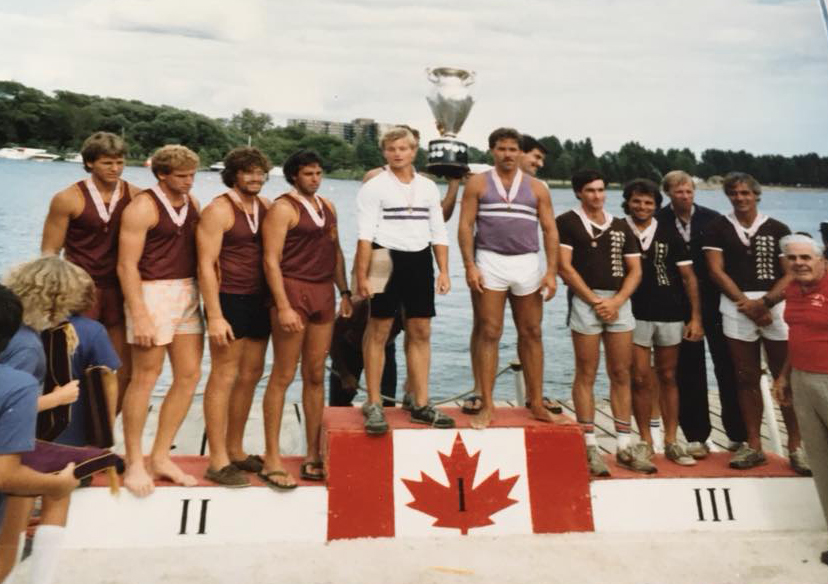 |
||||
| Time |
Club |
Crew |
||
| 1984 | 4:34.2 |
Mississauga |
Jeff
Ofield, Eric Smith, Chris Helyar, Gunnar Eggerton |
|
| Dartmouth |
The only crew member I’m in touch with is Eric Smith. I wrote to Eric and asked him to see if he has a story, but we haven’t got anything particularly novel or interesting. We both remember the race differently … I thought we had a comfortable lead the whole way, but Eric remembers worrying about another crew that was challenging us. I really don’t remember the race much except that it was my only year paddling at Missy, and it was unusual for me to be paddling for a club where winning was so common! I don’t remember who was where in the boat. I know I wasn’t either stroking or steering. I do know that Eric was the leader and called the race for us, but I don’t remember whether he did that from the stroke position or from the back, steering. I do remember that the following weekend I got married (the Black was at my wedding) and, yes, there was champagne in it … I don’t think it was used for a toast. I immediately moved to Edmonton taking the trophy with me. It was temporarily the centre piece of our new apartment in Edmonton. I do remember thinking that I was far too old to be paddling Junior C-4 (I was in my late 20’s), but now that I’ve raced Junior C-4 in my 50’s, I’ve changed my mind. … |
|||
| Chris
Helyar |
||||
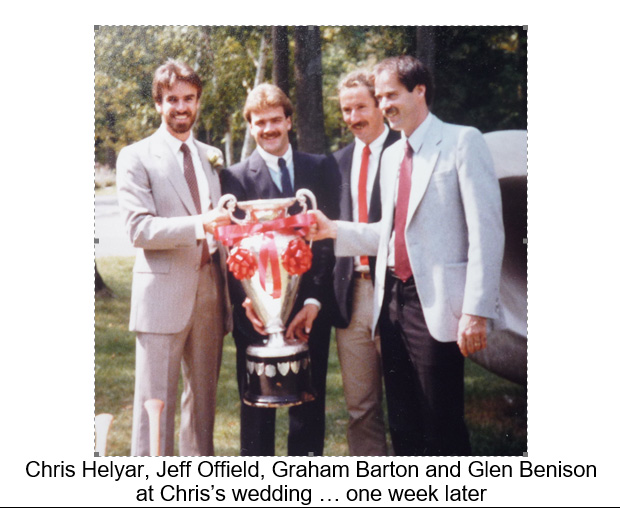 |
||||
| Editor’s note: Mississauga also won the E. R. Reilly Trophy (Juvenile) aka The Baby Black | ||||
| Time |
Club |
Crew |
||
| 1983 | 4:34.2 |
North
Bay |
Dave
Tafel, Graham Barton, John Armstrong, Scott Brough |
|
| Calgary |
Here is a stab at a story for our crew. Unfortunately I have lost contact with the boys. One of them sadly died way too young succumbing to an allergy. When I look back on my time with North Bay I have very fond memories of the experience. In many ways it was like paddling at the cottage. Summers putting on the kilometers while enjoying the camaraderie of the athletes and staff. While this may sound relaxing the spirit of excellence in the club was not lacking. There was a long history of success, former Olympians and a strong high performance program. In 1983 we knew we had a strong group and felt we had a chance at the Burgee even although we knew that Burloak was the favorite. We had a good lead going into the last afternoon of the National Championships with more than a dozen National Championships secured. However we could not make up for the depth in the Senior ranks that the Burloak brought down the course that afternoon so North Bay had settled for second. One of the races that made the event even more special was winning the Black. This was my second opportunity with a crew that had the potential to win. Almost a decade earlier paddling for West Rouge at the time we had a great local battle going on with the eventual winners from Balmy Beach. Although total wins were in our favor going into the Championship we edged out of the lane between two buoys and were disqualified. Of course as you age the story always gets better and short of lightning hitting us which in our minds is exactly what happened, we would have, of course, won that race had we not been disqualified. When I had a chance again in 1983 to challenge for the Black, we did not want to let this one slip through our hands. With teammates Scott Brough, John Armstrong and David Tafel we had a string of strong victories going into the Nationals. Our competition came from an Olympic Gold Medalist and his crew. We did not meet in the heats and our times were similar so we knew we had a fight on our hands. To be honest we were a little intimidated knowing Alwyn Morris was in the other boat. It was a tough race but we held on to win. The feeling of knowing that we had won the Black is one that only Black winners can know. The Black became a focal point of all the success that day. It did not take away from all the other National Champions who contributed to the success of the club that year but the Black is just too big and too prestigious to not take centre stage. There were Black parties to celebrate; there was much reminiscing with previous Black winners. The Black is a part of our heritage and for those of us who have enjoyed the sport of paddling for most of our lives the Black holds a special place in our heritage and our memories. This Black story is in memory of Scott Brough who was taken from us far before his time and to Dave and John who encouraged me in every race to “pick up the stroke rate”. … |
|||
Graham
Barton |
||||
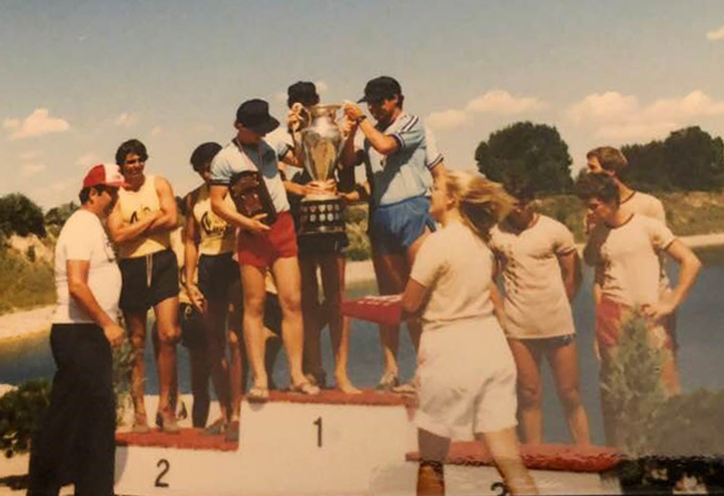 |
||||
| Editor’s note: North Bay also won the E. R. Reilly Trophy (Juvenile) aka The Baby Black | ||||
| Time |
Club |
Crew |
||
| 1982 | 4:37.9 |
Burnaby |
Colin
Shaw, Hugh Fisher, Drew Mitchell, Scott Selbie |
|
| Montreal |
|
|||
| Time |
Club |
Crew |
||
| 1981 | 4:20.2 |
Oakville |
Scott
Logan, Allan Thomson, Peter Koschanow, Larry Cain |
|
| Ottawa |
|
|||
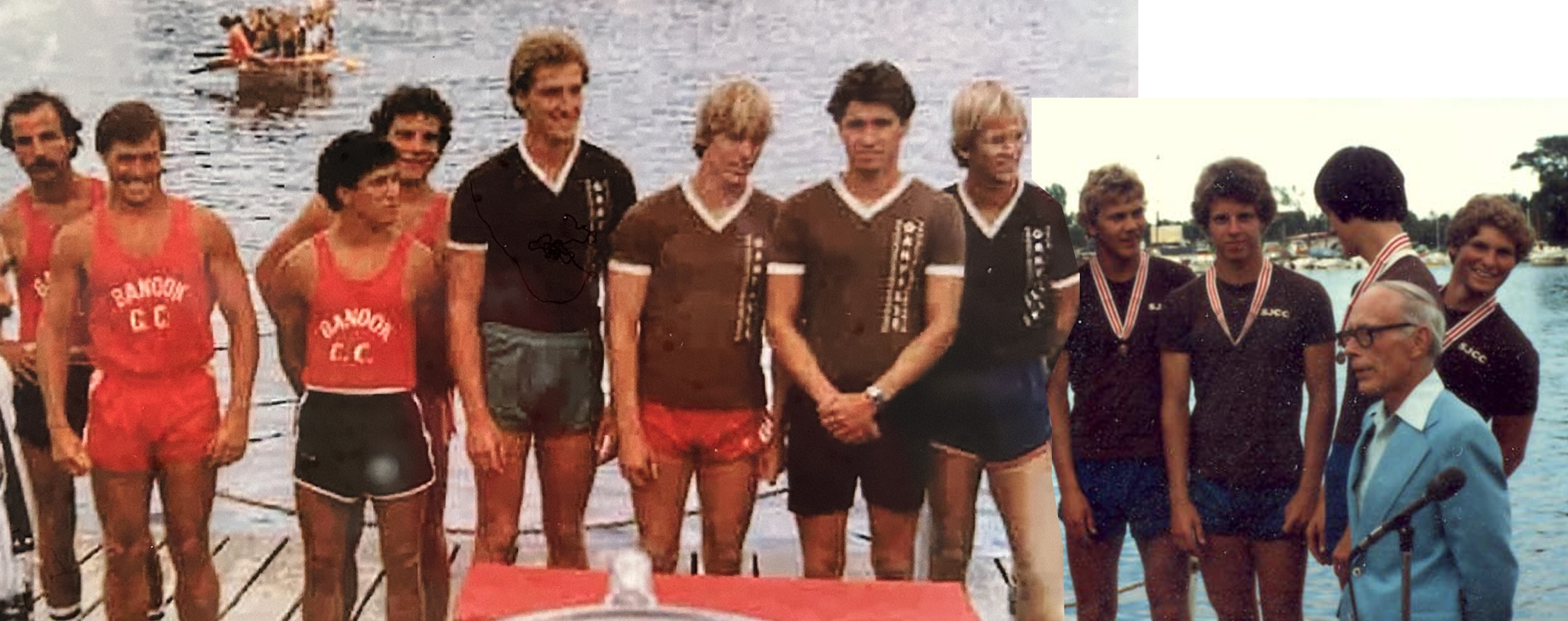 |
||||
| Time |
Club |
Crew |
||
| 1980 | 4:37.6 |
Oakville |
Adrian
Taylor, Brian Bliss, Doug Jones, Malcolm Macaulay |
|
| Dartmouth |
After paddling many years at Mohawk Canoe Club on Lake Ontario in Burlington I switched to Oakville in 1980. The main reason was that you could train on the water from April to October whereas on the lake it was unsafe in June, July and August and you would not even think of paddling on the lake in April, May, September or October – even though we would do it in war canoe at Mohawk. When I switched to Oakville there was a rebirth in enthusiasm for a lot of old Mohawk paddlers who also signed up at Oakville. It was a fun time because of the meshing together of the old and the new led by Dean Oldershaw who was coaching at Oakville. He had coached at Mohawk in 1972 and he was aware of the old Mohawk guys and what they could and could not do. I cannot remember when the rule was changed that if you did not get points in a senior event for three years you were able to revert back to junior – I think it was 1980 or even 1979. Anyway I had turned Senior in 1974 by coming second in the Junior C-4 race. In 1980 the other crew members were Doug Jones, Adrian Taylor and Malcolm Macaulay. All four of us grew up at Mohawk and were lucky enough to fall under the new rule at that time of reverting back to Junior. Adrian Taylor had turned senior in 1969 by coming second to Quebec (losing to the Turcott brothers) by less than a deck. At Mohawk in 1969 and from that day forward we were always reminded of that loss by inches – to work on our finishes. It was a heartbreaking loss for Adrian and for the whole club. Never did Adrian ever think that he would get another chance at that Black Trophy. The Trophy that holds 52 cans of Beer. Doug Jones was always a great war canoe paddler and in 1980 Doug was able to train more than he had ever done before in C-1 because of the calm water at Oakville and the encouragement from everybody else. It was a rebirth for Doug and he had a goal in mind that in years previous would not have happened. Malcolm Macaulay was another great crew paddler and he was one of the best fourth men in a tub C-4. Malcolm and I were winners in the 1976 Senior C-4 at CCA – so he was no slouch in the back of a C-4. So here we were in 1980 at CCA in Dartmouth and we find out that we are in lane 9. In those days lane 7, 8 and 9 were shallower than the other lanes and you had to not panic if your start was slower. Also in the inside lane was Quebec with the Turcott brothers back to try and recapture the Black. (You don’t think that Adrian Taylor was thinking about losing to Quebec AGAIN.) We started the race and at the second set of buoys Quebec was half a boat ahead of us – we got off to a slow start – a result of the lane and the nerves. Because of our training in small boats and in particular singles and doubles we overcame our slow start and won the race by open water. I was able
to win races at CCA over the years but I would have to say that
the Junior C-4 win for the Black Trophy in 1980 was one of my
favourites. To see my good friends rejoicing after that victory
and Adrian Taylor able to take a sip out of the Black Trophy
as a winner and a member of the BLACK WASH ESCAPEES was certainly
satisfying. … |
|||
Brian
Bliss |
||||
| Time |
Club |
Crew |
||
| 1979 | 4:29.6 |
Lachine |
André
Aubut, Mark Granger, Denis Francouer, Yves Schmidt |
|
| Welland |
The Black Trophy story – the truth is I don't really remember the details of the race. It was 1979 and I had won 4 gold and 2 silver that day. So things were going my way. I do remember passing out at the end of the race in the boat. It was a great battle with Missy. I know we partied as hard as we paddled the race so I don't remember much of that, too. |
|||
Mark
Granger |
||||
Editor’s note: Lachine also won the E. R. Reilly Trophy (Juvenile) aka The Baby Black |
||||
| Time |
Club |
Crew |
||
| 1978 | 4:46.5 |
Chateauguay |
Norm
Behrens, Fred Behrens, Bobby Oliver, Lenny Brown |
|
| Montreal |
"Black is in my blood." My cousin, Jake Hamilton, was an avid paddler. So much so, you could safely say he was religiously fanatic about it. He ate, slept and drank the water sport, forsaking all other recreational activities. His high regard and indelible enthusiasm for canoeing seemingly rubbed off on me because he literally talked my brother "Burloak" Barry and I into joining the Chateauguay Canoe Club in the mid-1960's, and not long after donning our CCC singlets and taking to the water, we both became as enthralled with flat-water racing as Jake. During his canoeing heyday in the '40's and early '50's, bleeding the former Chateauguay Aquatic Club blue and white, he, my uncle Brian Brady and their two buddies, Jean-Claude Lalumiere and Donny Duffey won what the majority of paddlers, past and present, consider the most prestigious race on Canadian Canoe Association championship circuit; the Junior Men’s C-4. With the win, the Chateauguay foursome laid claim to the revered John W. Black Trophy and joined an elite and envied group of paddlers who proudly have their names engraved on it. This particular piece of coveted hardware, affectionately known as canoeing's holy grail and Stanley Cup, is arguably (and to be completely honest, few will dispute it) the most sought-after award on the annual CCA race card. To be sure, it was Jake's proudest sporting moment. Winning "The Black" he says, is something he'll cherish the rest of his life. My
late uncle was not as enthusiastic about paddling as my cousin,
but Brian enjoyed the sport and adamantly admitted he was ecstatic
to have won "The Black". He swore the race would always
have a special place in his sport memories. My uncle and cousin
sprinted to victory in 1953 on the Mooney's Bay course in Ottawa,
to become the second Chateauguay crew to ever accomplish the feat.
Two years earlier at the same site, Jimmy Clayton, Eddie Smith,
Paul Duffey, and Jimmy Braid became Chateauguay's first foursome
to win the event. And coincidently, for the record, Jake and Brian's
win happened the same year I was born. And coincidently, also
for the record, by relating this, I'm blatantly giving away my
age. (Being sworn to secrecy and all the better for it, I shan't
let on that Jake is now in his seventies. ... Oops.)
Many spectators who witnessed the race felt it was a cocky, less-than-humble
gesture, but in all honesty we didn't mean it to be. It was an
innocent spur of the moment thing, and dagnabit, we were just
sooooo very happy; we thoroughly got caught up in the moment.
In fact, we later apologized for doing it. In hindsight, it might
have been an unconscious move. The day of the race, many people
speculated that either Mississauga or Balmy Beach who, incidentally,
had been battling it out all year on the Western Ontario circuit,
were shoe-ins to capture "The Black". All the pre-race
talk focused on those two crews. Paddling pundits outside the
Quebec division didn't even give us an outside chance of winning,
and lo and behold, we ended up finishing the race with at least
100 metres to spare.
I always wore flip-flops whenever we raced but for some strange
reason I decided to discard the one on my right foot and left
it on the wharf before we made our way to the starting line. At
the sound of the opening gun, my front foot slipped and I was
thrown off balance. Luckily, our stern-man, Fred Behrens, was
able to grab me as I fell backwards and pushed me back up into
position. We lost at least five good opening strokes but we managed
to regroup, catch up with the pack and quickly take a lead we'd
never relinquish. It was a nightmare moment I, for one, will certainly
never forget. Someone from our club took a picture of our crew
from the wharf before the race, and we all get a bit of a laugh
(and we also sigh a great deal) every time we look at it. There
we are looking confident and poised for victory, and included
in the photo is my discarded flip-flop sitting ominously on the
wharf. Needless to say, in future races no matter what boat I
paddled in, it always came with me. I recently became aware that the Black Trophy is no longer given to the winning crew to keep for one year, and I have mixed emotions about that. On the upside, it will definitely spare the trophy any unnecessary abuse, a la, being tossed into peat-bogs or drop-kicked into canals. But on the downside, and from personal experience, it was a pleasure to "own" the treasure for one year. I'm proud to say our '78 crew treated the Black Trophy with the utmost respect. We cleaned it thoroughly before we drank out of it at our party, and then cleaned and polished it afterward. We all found a nice, safe spot in our homes to display it and dusted it whenever required. We had it professionally engraved at the world renowned Birks Jewelers in Montreal. The etchings on the trophy's front torso reads; "Won in the 50th anniversary by Chateauguay" with our names, according to our positions in the boat, on either side. Proudly, we handed it back to CCA officials the following year in better condition than we received it. Hey, it's "The Black". The holy grail, the Stanley Cup of the CCA! We had to give it the respect it deserves.
In closing, good luck and god speed to all future “Black”
wannabes. Hopefully, some of you winners will be keeping it in
the family as I was fortunate enough to do. Believe me, there's
no race, or trophy, quite like it. |
|||
Bobby
Oliver |
||||
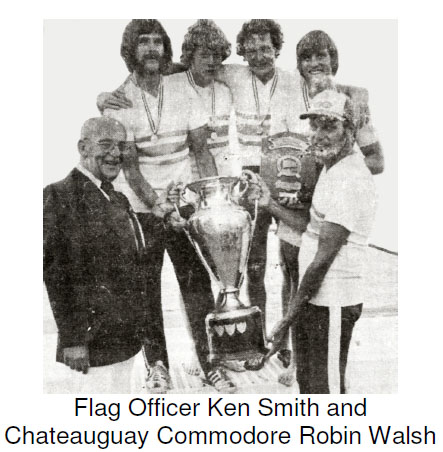 |
||||
| Time |
Club |
Crew |
||
| 1977 | 4:54.6 |
Carleton
Place |
Ivan
Charalambij, John Edwards, John Morris, Jack Shail |
|
| Dartmouth |
|
|||
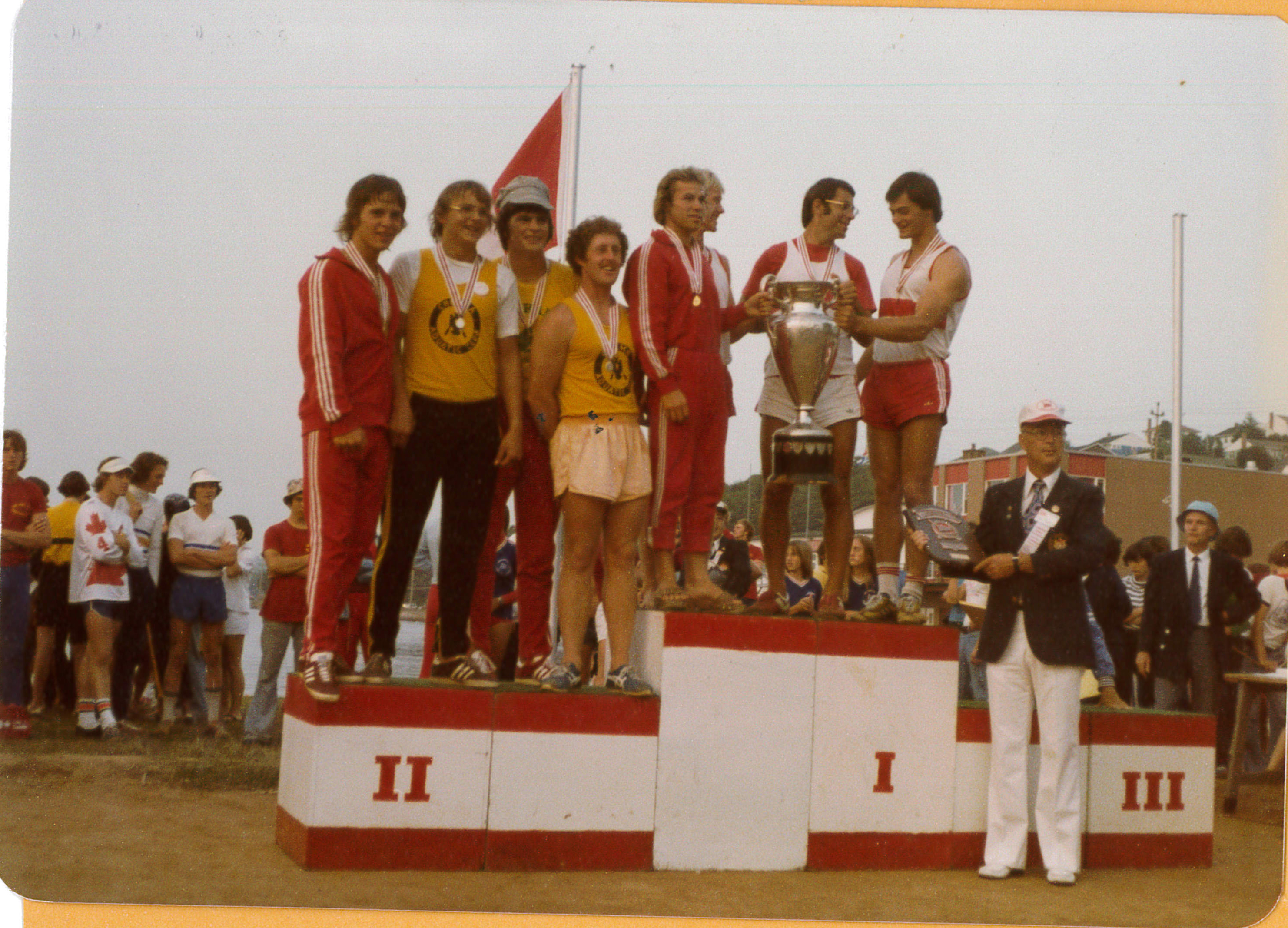 |
||||
| Time |
Club |
Crew |
||
| 1976 | 4:37.2 |
Rideau |
Bruce
Tippett, Les Farquharson, Brian Smith, Kevin O'Connor |
|
| Toronto |
In the early 1970’s, the Rideau Canoe Club experienced a resurgence in its performance at the national level winning the CCA Burgee in 1973 and producing a number of top male and female athletes and crews. Rideau had most recently won the Black Trophy in 1973 and 1974 and expectations were high that success could be continued going into the 1976 season. With the exception of one paddler, our 1976 Rideau Junior C-4 crew had been together for several years and had been reasonably successful in 1974 and 1975 at the Juvenile C-4 level coming second at CCA both years. Going into 1976, our crew consisted of the new addition, Kevin O’Connor (15 years old), as well as the returning members Bruce Tippett (16), Leslie Farquharson (17) and Brian Smith (17), all young enough to still contest the Juvenile C-4 title as well as shoot for the Black. We spent many week-day afternoons that summer working on the power and endurance needed for the back-to-back 500m Juvenile and 1,000m Junior C-4 races. After some early experimentation, we found the “Mic Mac” left, right, right, left set-up of the crew to be the most efficient, compensating for the perceived tendency of the RCC fiberglass “tub” C-4 to run to one side in race conditions. Regardless of what else the work-out consisted of, it invariably ended with a 1500m to 2000m hard pull including a final 1000m at race pace down the length of Mooney’s Bay. The races leading up to CCA, including the Eastern Ontario Championship, went well with wins in both age categories. Rideau did not own a wooden C-4 and we decided that we should race in the fiberglass boat we trained in as opposed to trying to borrow a better wooden boat at regattas. At CCA in Toronto, the 500m Juvenile race was hard and fast and we won by a boat-length from Otterburn and Cheema, coming down Lane 1 in front of the grandstand. However, the real test was still to come. After a brief rest on the water and a stop at the dock to change the lane number, we were headed back up Long Pond for the start of Junior C-4. During those summer afternoon work-outs, we had concentrated on a strong start building into an even pace to the 500m and then a major surge to pull away from the other crews in the second half. For the race for the Black that remained our strategy. We were off at the gun and well placed as we hit mid-race with the Junior crews from Otterburn and Cheema providing stiff competition. As per the plan we stepped up the intensity at the 500m but we didn’t really pull away as the other boats were surging as well. Finally Cheema dropped back about half a length while we and Otterburn went stroke for stroke over the final 250m. We called for the finish and, digging deep for one last sustained effort, it was done. The finish was too close to call from on the water and the judges needed extra time to review the finish and confer before the results were officially announced confirming that we had won.
We were, perhaps, a little on the young side to truly appreciate the opportunity to party with the Black and were regarded with some doubt when we later showed up at the Oldershaw’s house without the trophy while claiming to have won it (having given it to one of the sets of parents for safe-keeping). In any event, the crew has remained in touch over the following decades and keeps active in other forms of sport. However, winning the Black remains a piece of shared history that is indelibly stamped in our memories, just as our names are engraved on the trophy itself. |
|||
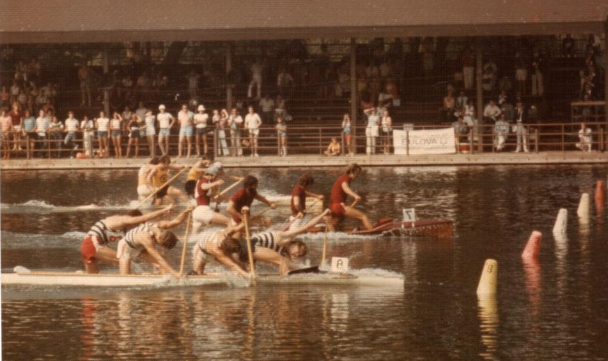 Editor’s note: Rideau also won the E. R. Reilly Trophy (Juvenile) aka The Baby Black with the same crew |
||||
| Time |
Club |
Crew |
||
| 1975 | 4:31.36 |
Balmy
Beach |
Peter
Hoy, Don Hoy, Ian Fyfe, John Hollins Sr. |
|
| Montreal |
It seems like ages ago (in fact, it was ages ago) when we won the Junior C-4 race at the Nationals and claimed the famous John Black Trophy. I would like to think that we were the best Junior C-4 crew in the country back in 1975, but, truth be told, luck was on our side and a number of fortuitous circumstances allowed us to claim our 15 minutes of fame that year. First, there was a very strong crew from West Rouge, comprised of Graham Barton, Chris Helyar, Mike Stockfish and Steve Miller, who had been beating us at most of the WOD regattas that summer. The Rouge crew was physically bigger and stronger than us. In our boat, Ian Fyfe hailed from Missy, so he was decorated with CCA medals. John Hollins, our team leader and source of inspiration, had won Junior War Canoe at Nationals in 1973, but Don and I were just typical Lake Ontario paddlers with a handful of local regatta war canoe and C-4 wins to our credit. However, in a sport such as ours, funny things can and do happen – and sometimes at a national championship. I recall quite vividly the day of the Junior Four heats. There were two heats and we won the first one. West Rouge was in the second heat and was ahead until tragedy struck at the 750 meter mark when their boat inexplicably veered out of their lane, resulting in disqualification. Notwithstanding the rivalry that had developed between our crews over the summer, we were in fact pretty good friends with the Rouge boys and their coach, Glen Benison (another Black winner), so we couldn’t help but feel badly for them. Their disappointment, however, was partially offset when Steve and Graham won gold later in the Junior C-2 final. Let it be noted that Graham and Chris persevered and both have won the Black, along with many other national championships over the course of their paddling careers. More recently, I have had the good fortune of racing with Mike, Steve and Chris at numerous international events with the Senior Men’s Dragon boat team. Back to the story - with West Rouge out, our competition looked to be from Gananoque and Banook, and we knew that they would be tough to beat. Again, fate seemed to intervene in our favour. The day of the Junior Fours final was overcast and very windy. In fact, the tailwind was so strong that there were whitecaps in the Basin. Being a small and light crew, we couldn’t have asked for better conditions. We were also used to rough water conditions, having paddled in many lake regattas. The two things I remember from the race were hearing Dean Oldershaw shouting encouragement at the start of the race - his K-2 race followed ours and his words of encouragement provided terrific motivation, and, secondly, closing on the finish line thinking we were in a dead heat with other crews. I was so focused during the race that I can only remember hearing a lot of noise coming from the bleachers. Needless to say, I was surprised when we crossed the line with about 4 boat lengths of open water to spare. It was an unforgettable feeling. With the tailwind, we posted a time of 4:31, which was 2 seconds off the existing record. A couple of personal observations to share: a)
You don’t have to be the most talented small boat paddler
to win the Black (although most, if not all, of our top athletes
have competed for and won the Black). Although the C-4 “tubs”
require a foursome that works as a team to keep the boat running
straight, as well as maximizing the limited glide - a bit of luck
doesn’t hurt either; Finally, I would like to mention the two people (both legends in our sport), who helped us reach a higher level that summer through their coaching and motivation, the late Bill Collins and Bob Sleeth, Sr. As they say at the Beach, “may the wind always be at your back”. |
|||
Peter
Hoy |
||||
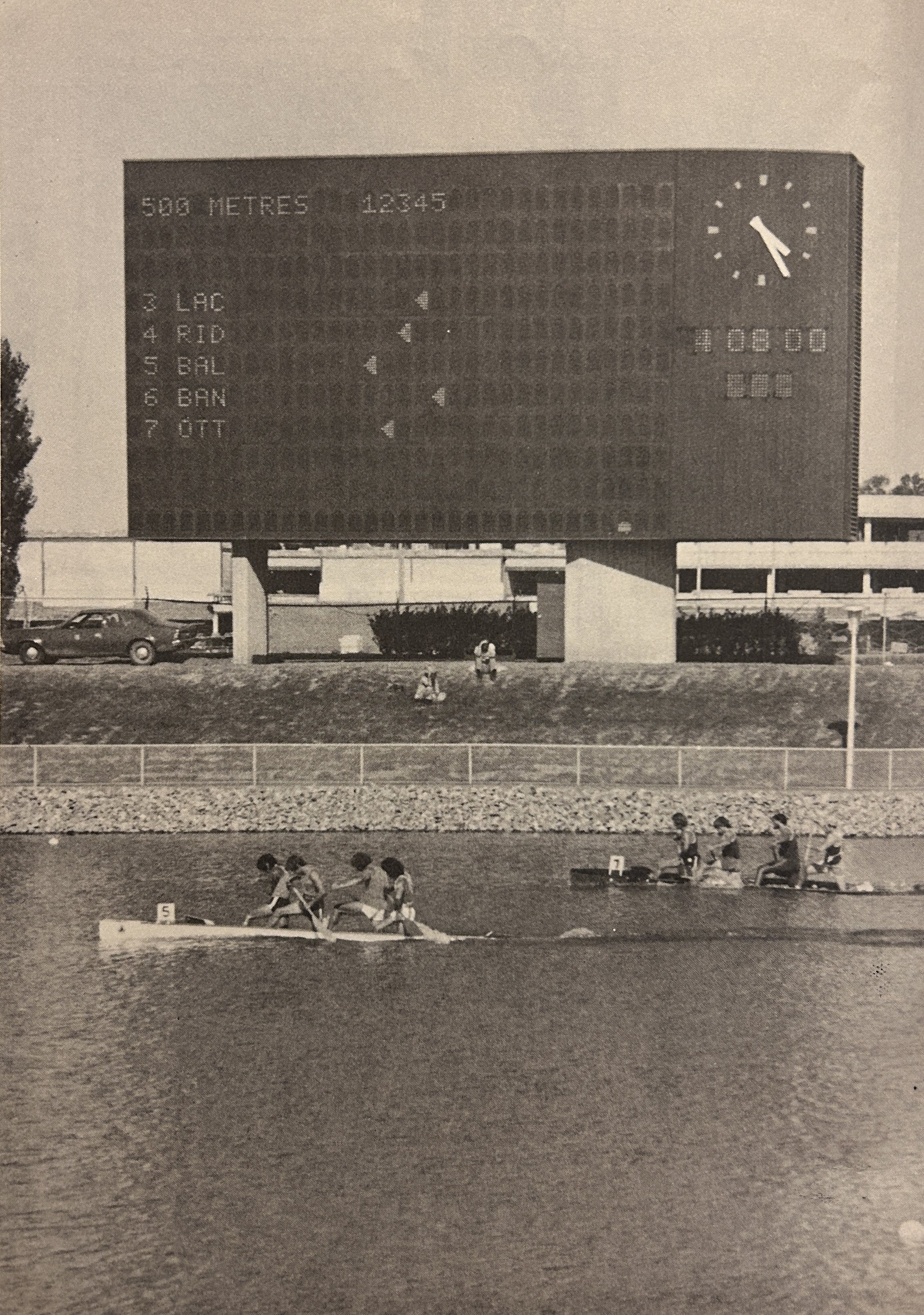 |
||||
| Time |
Club |
Crew |
||
| 1974 | 4:44.3 |
Rideau |
Bruce
Raymond, Dave Joyce, Bruce Gilbert, Dan Murphy |
|
| Toronto |
|
|||
| Time |
Club |
Crew |
||
| 1973 | 4:48.3 |
Rideau |
Trevor
Woodside, Steven Samson, Ross Bales, Peter Bourassa |
|
| Toronto |
|
|||
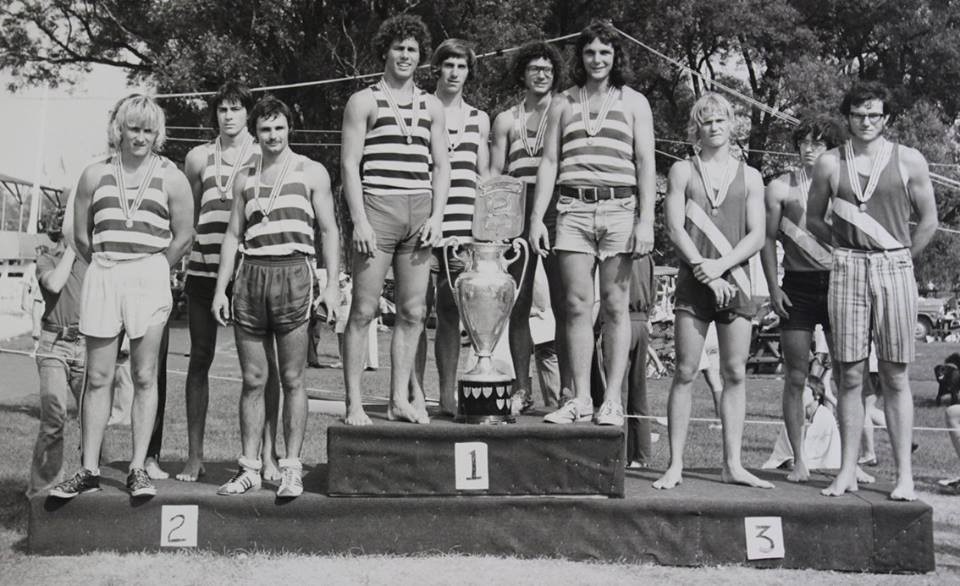 Editor’s note: Rideau also won the E. R. Reilly Trophy (Juvenile) aka The Baby Black |
||||
| Time |
Club |
Crew |
||
| 1972 | 4:43.5 |
Balmy
Beach |
Rob
Sleeth Jr., Scott Williamson, Gord MacIlquham, Ron Wright |
|
| Winnipeg |
After all this time I still remember the excitement and self satisfaction that I felt that day we won The Black. What a fantastic idea to create this book of the storied history of The Black and all the great paddlers that have managed to win such a prestigious trophy (at the expense of all of those “Blackwashers” that did not). As I read all the names of the winners since 1913 that had come before and after our victory and share in their memories, I recognize so many old friends, acquaintances and people I knew of that helped to shape this great sport of Canoeing. It gives me goose bumps each time I think about that eventful day and as each year goes by realizing that Gord MacIlquham, Rob Sleeth, Scott Williamson and Ron Wright are a part of the great Balmy Beach tradition. We joined nine other crews from Beach (the most by any club at the time!!) to have our names engraved on The Black Trophy forever and becoming a part of Canadian Canoeing History. It is actually mind-boggling! We owe a lot to Mr. Sleeth, our coach, and the many volunteers at Balmy Beach. It was Rob Sleeth, Jr.’s 18th birthday; Ron Wright would win again in 1986. How would we know what 1972 would bring? It certainly did not start out that way. As three of us (Ronnie, Rob and myself) were turning Junior and moving up to a much more competitive class we only had a handful of people show up for our first war canoe practice in April that year. You see growing up in the east end of Toronto on the lake gave flat water canoeing a whole new meaning. We put together two makeshift four-boats and ventured out into the cold and choppy Lake Ontario water for a paddle. It wasn’t until a few weeks before the Mississauga annual regatta on the Credit River that our Black crew got together for the first time. It was more by accident then design. We had little preparation but managed to come second at Missy. We all thought “what a great race” and had a chance to qualify for CCA in a small boat. We were beaten by a very good crew from Carleton Place at the Dominion Day regatta, and ended up a strong second. I think everyone at Beach were surprised … we were! I remember it being a fairly close race but we were always behind from the start. I think that our confidence grew as we did not seem to lose anything to them after about 250-300 meters into the race. We came into the Mohawk regatta and easily won the Jr. C-4 race. This was partly due to skill and partly due to the choppy water and the tricky backwash of the famous Burlington wall. We must have had an outside lane! Oh, I remember it well. It was my first victory in my paddling career and for Rob, Scottie and Ronnie it may have been their first small- boat win as well. It was also the first time the announcer (could have been the late Mr. Ken Lane) tried to pronounce my last name. Shear magic! The next significant point in the season came at our own regatta - Balmy Beach. Every year the late Ted Reeve, a sports icon in Toronto area, would write an article in the Toronto Telegram about the Balmy Beach regatta, its illustrious history and folk lore (Balmy Beach has won two Grey Cups, several Volleyball and Rugby Championships and the Burgee in 1955 and maybe the oldest Canoe Club in Canada). This was certainly a big event as what seemed like thousands of people would line the boardwalk and family and friends would come down and cheer on the locals. If you happened to be a member (or guest) you could watch the races perched up on the deck. Raised about 15 or 20 feet off the ground it was a magnificent place to relax overlooking the water on those hot summer days with your favorite drink. I do not remember much about the race. I do, however; remember padding into shore after the finish of our C- 4 race to a bewildered Mr. Sleeth standing on the beach and asking “what happened”! You see the next Monday morning a major Toronto newspaper’s sports section had a great picture of us with the caption “the shoe in four got shoed-out”. We had lost to a strong Mohawk crew in front of our home crowd. It was a very disappointing day. Over the remaining weeks leading up to WOD (CCA qualifications) our training intensified. No longer was it good enough to train on the unpredictable lake. We had to load the boats on cars and travel many miles in search of flat water. Ashbridges Bay was too short, the Don River was too swallow and stinky. The Turning Basin located on the grungy east Toronto waterfront was ok if you could dodge the sewage and stand the smell. Sometimes we would launch our boat from the Leslie Street Spit and make the short trip across the Eastern Gap to train on Long Pond. We put in as many miles in the car as on the water, but it must have worked. Not only did we qualify but we beat Mohawk by open water to win. Our trip to the Ontario’s in Peterborough was most interesting. I remember being up at the starting line. We had the outside lane and were looking down the course to pick a point of reference as was normal on lake regattas (not many lane makers for the first 500 of 1000 m races). We got off the line quickly as we now did and paddled our race or so we thought. From what I do remember something “ran amuck”. We lost our bearings and drifted outside the course. Taking the long way home we lost to Carleton Place by a couple of lengths and ended up second, not too bad a showing but not what we wanted. However; as funny as it sounds this was the first time that we truly believed that we had a chance to win The Black. We made the trip to Winnipeg by plane thanks to a huge fund raising effort by the volunteers (Ron, Sr. and Sylvia Wright, Dolly Sleeth, Patsy and Snuffy, our Commodore, Dennis, Barb Carpenter and TK, the Salders, the Vallers, Stan Kline, Kenny Bingham and, of course, the Balmy Beach Club executive and members). It was the first time many of us had been on a plane. The decision to fly was made in part after our experiences with the long and eventful train ride down and back from Halifax the previous year. It was very exciting. Once settled in our hotel, we headed down to Winnipeg Canoe Club, our hosts, to check that our equipment had arrived (thanks to Cornel Worthy and Bob Miller) and go out for a paddle. The place was buzzing. There was an excitement in the air which I had not experienced previously. Things just seemed to be falling into place. We were out on the water paddling up and down the course and decided to practice a few starts. The Mississauga Juvenile war canoe was also out and we agreed to go together. “Paddles up and go”! With our customary “flick 3 and 20” we jumped out and sprinted ahead. We knew we were ready! I would like to tell you that we had a fantastic race plan and we spent many hours going over strategy leading up to the race but I do not remember that being the case. We thought we had a good chance for a medal and possibly to win. At race time we prepared our boat, whipped in and taped our number on the bow. I do not remember our lane number but we were in the middle (possibly 4 or 5). Mr. Sleeth checked our level, all the well wishers yelled encouragement as we paddled down to the start and took up a spot about 20 – 30 meters behind the line. The Starter called us up to the line and we moved slowly into position. I remember North Bay and Carleton Place being to our right and Mohawk to our left. Through the megaphone the Starter called “Paddles up” and bang we were off. I know we had a very fast start, because, as the stroke, I could not see any one on my right or left side after our transition (out of the start). Our boat was moving smoothly through the water with little bounce. A very good sign! I do not specifically recall the details of the race but the one thing I do know was that after about 200 meters I could not hear the other boats but I dare not take a peek. Just the sound of Ronnie’s voice calling for a dozen or a series what seemed like every 50 meters. What I do recall most vividly was us moving through the 500 m buoys and the on-coming sound of the crowd. You see the course was set up in such a way that the docks, boat launch and crowds were lined up starting about 200 m out from the finish. The cheering crowd was enough to motivate anyone home. BANG! The
sound of the gun echoed through the roar of the crowd. We kept
going for a moment as our focus and attention was directed to
winning not wanting to acknowledge the inevitable. Now there
is a great debate between the guys as to where we were (let’s
just say we were well through the 500 meter markers) and as
we stopped paddling and turned to see what had happened (it
looked like the 4th and 5th place crews on the inside had collided).
What was certain was the race had been stopped, a crew had been
kicked out (I believe Carleton Place) and we were instructed
to return to the start for a re-race. For that moment emotion
must have got the better of me. I was in shock and yelping.
Scottie and Ronnie did their best to calm me down. We had another
race to run; let’s get re-focused. We pulled over to shore
and emptied our boat. We circled
behind the start and slowly moved into position. I know we were
nervous but managed to re-focus ourselves because as soon as
we heard the starter’s call and “bang” we
were off. This start was much the same as the first (maybe better)
and with each stoke we continued to pull ahead. This time we
moved through the 500, then 250 and could hear the crowd chant
“Beach, Beach”. It was an amazing feeling. The next
bang we heard was at the finish. We had won. I could have turned
to Rob in a congratulatory motion and wish him a Happy Birthday
but I didn’t, the grimace on his face, in a manner only
he could, need no words. We had won The Black, after two starts
and over 1500 meters of shear “guts and determination”.
The four boys from Balmy Beach beat the odds and were CCA champions.
Suddenly there was an announcement “Here are your official results of the Men’s Junior C-4 1,000 meters … 1st place Balmy Beach, Rob Sleeth (18th birthday), Scottie Williamson, Ron Wright and Gord MacIlquham” … Winners of the John Black Trophy. What a relief! What a day! By the time we got back to our hotel the celebration had already started. Not only did Balmy Beach win The Black but we won Junior C-2 (Jock and Jim), Junior K-1 (Louie); Junior K-2 (Louie and Robert) and Junior K-4 (Louie, Robert, Steve and Kevin). What a banner day. And to top it off we won the Junior Burgee. A great day for Balmy Beach! We immediately filled up The Black with the customary cold beer (yes, we did have beer sitting in the bath tub on ice but do not remember how it got there) and proceeded to take turns “one arming it” as we quaffed back the best beer ever made. This was our night. Someone brought in a cake (for Rob) and the cigar smoke was billowing throughout the room. People would drop by to congratulate us and try their hand at drinking from The Black. I think I remember the Oldershaws coming into our room along with the Beach folks (Wrights, Dennis’, Cornel and Bobby, Bob Sr., Jim Mossman, et al.). There must have been some party that night or so I was told. The next day we headed home. After some discussion with the airline about bringing trophies on the plane we took off for Toronto. I do remember a quick stop at my parent’s house as I lugged The Black up the many stairs to show off the trophy and leave my gold medal in the safe hands of my mum, another proud moment. We continued on to the Balmy Beach Club and proceeded to fill the trophy with draught beer. Several of the members attempted to drink from the cup many spilling more on them then drinking. But it didn’t matter. After a year’s absence The Black was back in the Beach. Dedicated to all The Black winners who have or will win The Black and to the wonderful people involved in Canoeing. Regards, the 1972 Black Winners and Junior C-4 CCA Champions Gord MacIlquham, Rob Sleeth, Scott Williamson and Ron Wright – we salute you. The above was written by Gord MacIlquham in January 2010 with encouragement from Scottie, Rob and Ronnie, 38 years after our victory. Up the Beach! |
|||
Gord
MacIlquham |
||||
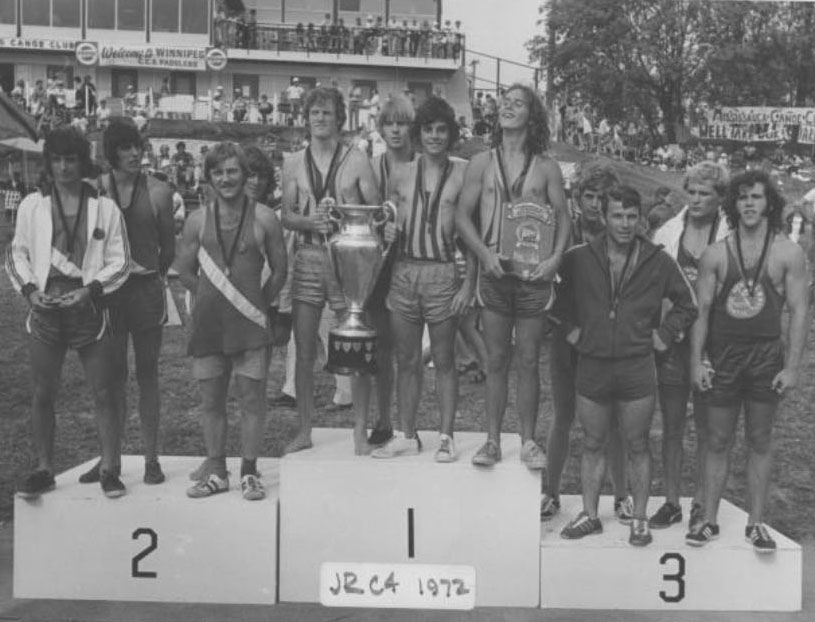 Editor’s note: Second father then son win - Bob Sleeth, Sr. Cartierville, 1948 |
||||
| Time |
Club |
Crew |
||
| 1971 | 4:30.5 |
Quebec |
Scott
Oldershaw, Pierre Tremblay, Claude Chartier, Bill Leblanc |
|
| Dartmouth |
|
|||
Editor’s note: First father then son win - Bert Oldershaw, Island, 1940 |
||||
| Time |
Club |
Crew |
||
| 1970 | 4:19.9 |
Balmy
Beach |
Jock
Stewart, Reg Dyson, Jim Farintosh, George Stewart |
|
| Otterburn
Pk |
At the Balmy Beach Canoe Club there had been barren times through the late sixties, as the club had not won a small boat race at CCA of any kind for a number of years (I think since 1963). Societal values were changing at the time and many of the traditional activities in the east end were being challenged with alternate lifestyles … there was a makeshift “hippie commune” group right beside the club through the summer. It was an interesting time to grow up. At twenty years old I had come through my teens with little paddling success, but still had a love for the sport. I was fortunate to find three other fellows who saw life the same way: Jock Stewart, George Stewart and Reg Dyson. At that time the club was still training on open Lake Ontario and had recently purchased two new fiberglass C-4’s and we adopted one of these boats as our own. We ended up gluing in bits of support foam for our blocks and foot rests, there must have been twenty chunks of the stuff set up in very strategic places. We were a very fast crew off the line, but had limited confidence in our whole race abilities. It was tough for anyone from Beach to feel confident in those days – the days of open lake water training were fast coming to an end. Our breakthrough race came at our club regatta, when we beat Mississauga and Mohawk crews to win Junior C-4 for Beach for the first time in 7 years. We then went to WOD and we were barely able to scrape in to CCA (after a race off at Mississauga) as the last Western Division entry. We were the only entry for Beach at the national championships so the four of us drove down to Otterburn, Quebec by ourselves. I remember the race well. There were no heats, they just sent out 15 crews, lined up everyone, told us all to find our water, and pulled the shotgun. We were off and immediately winning the race, although Quebec and Mississauga were close behind. In those days there were no rules about staying in your lane, so you picked a line and tried to stay “in your water”. Quebec was right beside us and it soon became a race between the two crews. The two boats started to drift closer together and the referee shouted at us that we were first and second and if we collided he was not going to stop the race. This immediately made both crews respect each other’s water, a smart move by the referee. The race was a dogfight. I never wanted anything more in my life as I had never won anything at CCA. The finish was very close, we were not sure of the final result until we were sitting on the dock and heard our name announced. Joy! Bedlam! Receiving the Stanley Cup of paddling was like a dream at that time. Everyone was congratulating us, even Gump Worsley from the Montreal Canadiens. We had no one to celebrate with, so Bert Oldershaw invited us to join Mississauga that night at their club party and the victory was toasted many times that night in traditional Black style. At that time you were allowed to keep the trophy all year, so we were able to celebrate back in Toronto as well. I feel the race gave the club a shot of confidence, as Beach was able to win the junior burgee two years later in Winnipeg. In those days, you really only got one chance to win the Black, as you turned senior for life if you won twice at the junior level. Many top paddlers never won and were considered “Blackwash”. The rules later changed and I was able to race for the Black 25 years later in 1995 with three young men … also a great experience. B ut for four young east end boys in 1970, it was a very big moment in our early lives. |
|||
Best
Time |
||||
Jim
Farintosh |
||||
| Time |
Club |
Crew |
||
| 1969 | 4:32.0 |
Quebec |
Bernard
Turcot, Roger Turcot, Jacques Scherrer, Lou Paquet |
|
| Ottawa |
|
|||
| Editor’s note: Quebec also won the E. R. Reilly Trophy (Juvenile) aka The Baby Black | ||||
| Time |
Club |
Crew |
||
| 1968 | 4:26.2 |
West
Rouge |
Ron
Woitzik, Bob Abbott, Brien Petts, Ricky Betts |
|
| St.
Catharine's |
|
|||
Best
Time |
||||
| Time |
Club |
Crew |
||
| 1967 | 4:36.6 |
Mississauga |
Brian
'Brute' Burton, Jeff Green, Scott Lee, John Wood |
|
| Montreal |
|
|||
| Time |
Club |
Crew |
||
| 1966 | 4:32.4 |
Cartierville |
Tommy
Edge, Brian Smiley, Mike McNamara, Brian Barton |
|
| Ottawa |
I do not remember how the four of us originally got together for this C¬4. I do remember that we were inconsistent throughout the year. I looked through my old winning crests and found that we won in Lachine and in our own club Cartierville. We were always in the lead at the halfway mark but often lost out in the last quarter. We were at a loss as to why this should be as we all had heart and balls. The races were lost, not due to giving up, but for some other reason. A few weeks before the Dominions (as the Canadian Championships were called back then) one of our coaches, Big Al McLeary, came out with us to watch our style. He found that Tommy Edge, who is a solid lad, tended to keep his head down (thereby depriving him of oxygen) and as he got tired he would bounce the boat (Tommy is an exuberant guy). We went out and practiced this and to tell you the truth I could not say if it helped because we needed a race to gauge the results. Dominions 1966: Cartierville had won the previous nine Dominions in cumulative points and I was aware of that fact. Mississauga was the up and coming club and at the lunch break Mississauga led Cartierville by 17 points (62-45). Our race was the 2nd after lunch. I remember the race very well. We were very nervous at the start because we knew we had a good crew but had had such mixed results. Would Big Al’s ideas work? Mississauga had a crew in lane 1; we were in lane 6 and there was a very good crew outside of us from Quebec with the Turcot brothers and Lou Barrette. The gun went off and we took our first stroke. Immediately our platform slipped out of the catches that keep it in place and the front moved up the left side and the back end moved up the right side. We almost tipped over - did not - but took on about two to three inches of water. I do remember thinking that if we did not place then Cartierville could never win the Burgee. While all of the other boats were racing off into the distance we were frantically trying to get the platform back in the middle and get our buns reestablished under our knees. Before we took our second stroke we were easily two to three boats behind. All of us were yelling LET`S GO, LET`S GO. We settled in and got a very good pace going and everyone in the boat became quiet and focused. We went from a depressing last to a confident feeling as we were catching boats near us. I remember the boat moving smoothly and when you get in a good groove with a good crew then your energy level stays high. At 250 metres I called a series - we all took 10 longer, harder, faster strokes and after coming out of it and back into our regular stroke I could see we were just behind the middle of the pack. As I was steering and calling our race I could take a quick look around and I saw that Mississauga was not far ahead at all. At the 500 metres I called another series and we motored on. At this point we were moving ahead of most crews. I would normally call out the 10 strokes of the series, but at 750 metres there was no way I could call out any numbers. After this series we had left everyone except the Quebec crew out on my left. It was hard to tell how far they were ahead of us, maybe a boat length or two. I yelled at Tommy SIT UP, SIT UP, BREATH, BREATH, and, of course, Tommy was able to swear back at me. Mike McNamara did a great job of keeping us in the battle with timing and pace of the stroke. As we approached the last 100 metres, the question in my mind was when to call the finish. I don`t remember, but I think with about 75 metres to go we called a finish. I could see out of my right eye that Quebec was with us. As any of you know, when you are completely spent, it is the time when you have to dig deeper and hope the adrenaline rush will carry you to the win. We crossed the finish line about a deck length ahead of Quebec (although we were not a 100% sure of this). The incredible fact that we had come back from such a horrible start to win had us all in a euphoric state. We would have started drinking ourselves silly but had war canoes later on. After this race the total was Mississauga 67- Cartierville 65. We had done our job! We battled Mississauga all day and going into the last race we were ahead by one point in total. The last race was the Open War Canoe that we lost to Mississauga - so the end of an era was upon us. Some notes:
(1) we drank a lot of beer out of that Black Trophy even though
it spilt all over you trying to do so. You needed a mouth that
is 6 inches wide to catch everything; (2) I think my memory
is correct - the Black holds 50 bottles of beer; (3) we had
the trophy at the club for some time and I had it at my place
for awhile. |
|||
Brian
Barton |
||||
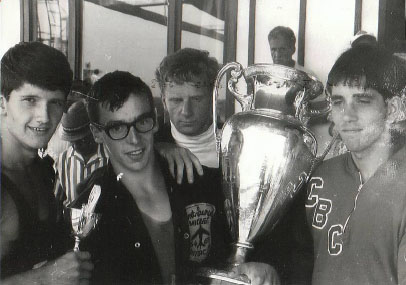 |
||||
| Time |
Club |
Crew |
||
| 1965 | 4:32.7 |
Lachine |
Alan
Wright, Glen Benison, Dave Brown, Eric Shepherd |
|
| Ottawa |
The summer of 1965 was full of thrills. We were on a roll through the Quebec Division regattas, winning Junior C-4 week after week. With Bob Dylan’s lyrics and music driving our souls, our minds began to dream of being able to go the distance and win the Black Trophy. And then in one fell swoop, the wind was sucked from our sails. One of our senior club directors traveled to far-off Toronto to be a spectator at the Balmy Beach regatta. He returned with that regatta’s race program and as I flipped through the pages looking at the results, I saw his scribbled note on the Junior C-4 page. Four words that drove my spirits into a downward spiral. His four words: “Missy by 10 lengths”. (GB) The movement of the twelve crews appeared to be at random as they gathered at the starting buoys. Every one of those forty-eight paddlers was keen to win, for victory on that day came with the promise of drinking from the most revered trophy among the paddling fraternity: the Black Trophy. Our task would not be easy. The challenge would be great. We were in Ottawa to win and anything less would be a disappointment. This was our moment of truth. (AW) We had talked about our race strategy. Our series would be coded A, B and C so that our competitors would not know how many strokes we'd be turning it on for. We stayed well back on the starting line, heads down, concentrating on the task ahead. We knew the Starter. We knew how his anger could make him become erratic and irrational. (He would get us two weeks later at the North American championships in Gananoque.) Our collective minds were focused as one. We were determined to execute our game plan perfectly. (DB) Paddles up! Bang! We’re off to a good start. OK, lengthen the stroke. “Series!” Don’t bounce the boat. Don’t look around. “Series!” Now 250M, we’re in the race. “Series!” Jeez, coming up to the 500M and we’re still up there. We can win this race. Where’s that hot Mississauga crew with Oldershaw and Hickox … who are those guys? Gotta open my left hand, don’t cramp up. We’re leading. Don’t blow it. “Series!” Now the 750M mark and I am sweating like crazy yet I am cold … same as always. Starting to see spots. We’re about to head into the finish, it’s now or never. Our guys are giving it all they’ve got. “Series!” Jeez, Dave!! (ES) When we needed to get a jump on another crew, the coxswain called for a series. We gave Dave the series and then settled back into our normal racing rhythm … but not for long. The series kept being called for. I dug in and responded to each call for a series. I followed Eric’s lead. I was inspired as I watched his blade cutting through the waters at Hog’s Back. But why this seemingly endless call for series after series? This was not meant to be, for it was impossible to quicken the tempo and increase the effort that many times in a race and survive it. How many times could an athlete respond? On that day, for me, it seemed to be “whatever number it takes to win.” My commitment of mind and body to this race was total. The coxswain had programmed me. (AW) After 750M, Alan asked me where Missy was. I looked over to our right and saw a crew pounding in the strokes at a frantic pace. What raced through my mind at that moment were three guys forever blaming me for not recognizing that Missy was gunning for us and having them catch us at the line. I sort of panicked and yelled: “Here comes Missy!!!”. From somewhere deep inside, and especially from Alan, we turned it up a notch. The bow lifted even further out of the water. (DB) We crossed the finish line victorious. Missy was three or four boat lengths behind us. I raised my paddle over my head, pointing the blade to the heavens. I shut my eyes and murmured “Finally” and then I collapsed into the water. After this highest moment of my paddling career, I was an emotional as well as a physical basket case. My whole being protested the trial and trauma it had just suffered through. (AW) The dock was swarming with Lachine supporters and crewmates. Their cheering for us was soul-moving. It was a moment of unbelievable glory awash in the sweet and soothing contentment of knowing our huge task had been accomplished. We stepped ashore and were mobbed. And then the four of us wandered off together as a crew. We walked across the Hog’s Back Bridge to the waterfall that shoots over the rocks just beyond the finish line and there we sat as one. No other circumstance in life would have brought the four of us together to be friends. Sitting upon those rocks in Ottawa, I became absorbed in my own sweet thoughts of victory. It was a feeling of lightness of being. There wasn’t a care in my world and time stood still. The near deafening roar of the waterfall prevented any of us from communicating verbally and yet, at that time and in that space, a union of souls took root. The union has lasted more than forty years and may have proved to be of more importance than the C-4 victory itself. (GB) After the trophy was awarded, after the photos were taken, after the backslapping was complete, we turned down the rag top of Eric’s Chevy convertible. We sat up in the back seat hoisting the Black for all to see and left the Rideau Canoe Club grounds for the best of journeys back home to Lachine. Picture me fidgeting absent-mindedly with a golden ring as I sit here at my home computer pondering my contribution to our collective memories. Picture a ring bearing the City of Lachine coat of arms. Picture the coat of arms fading but the ring pure gold forever. (AW) |
|||
Glen
Benison, Alan Wright, Dave Brown, Eric Shepherd |
||||
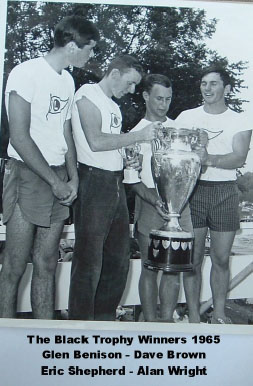 |
||||
| Time |
Club |
Crew |
||
| 1964 | 4:31.1 |
Cartierville |
Barclay
Allen, Peter Radford, Andy Kasper, Roddy Bossy |
|
| Ottawa |
|
|||
Best
Time |
||||
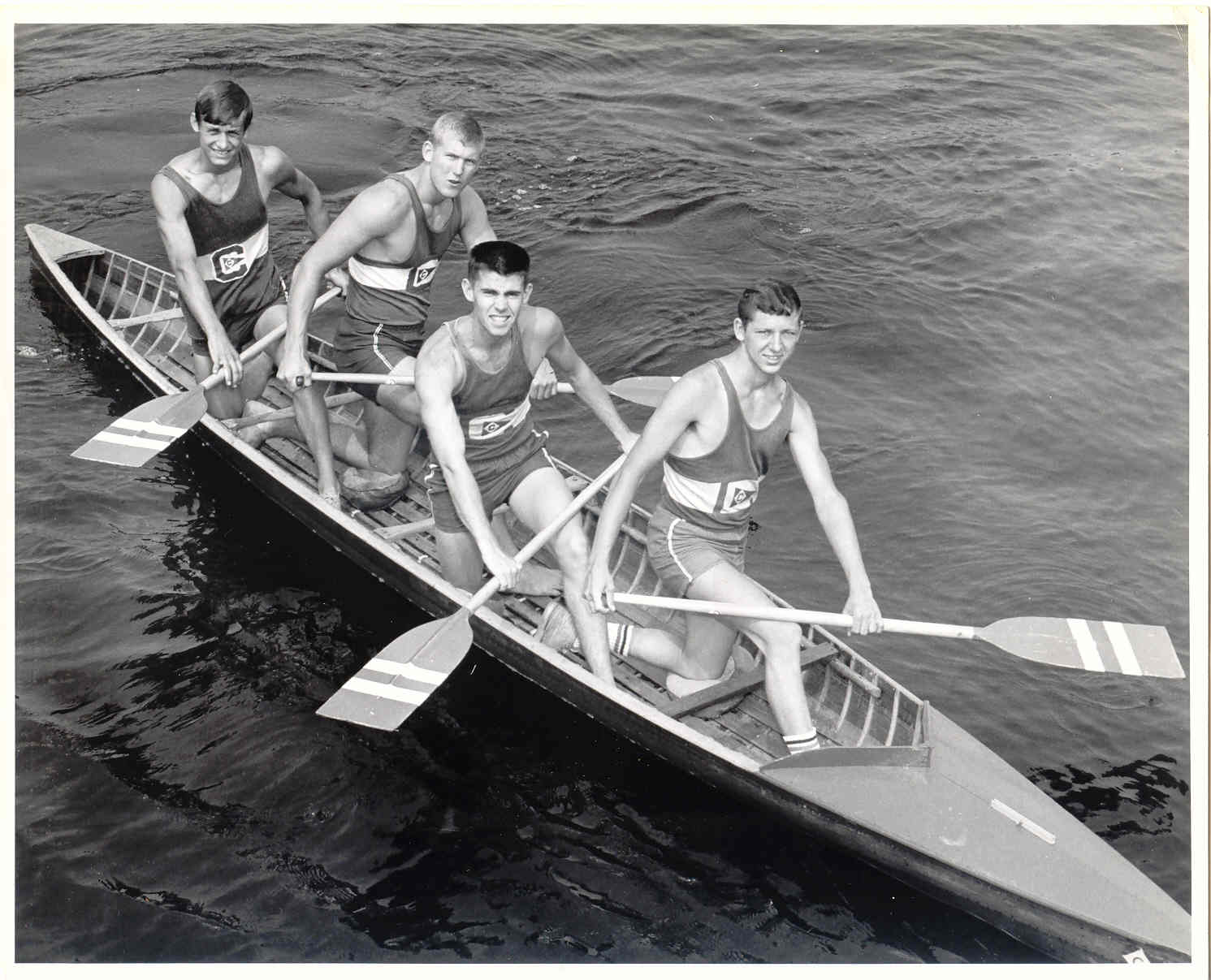 |
||||
| Time |
Club |
Crew |
||
| 1963 | 4:36 |
Balmy
Beach |
Phil
Redwood, Dave Deveaux, Claus Ahlberg, Jon Morgan |
|
| Ottawa |
|
|||
| Time |
Club |
Crew |
||
| 1962 | 4:31.5 |
Toronto
Sailing |
Art
Fogg, D. Milligan, W. Hill, J. Pulkinghorn |
|
| Ottawa |
|
|||
Best
Time |
||||
| Time |
Club |
Crew |
||
| 1961 | 4:42.2 |
Cartierville |
Richard
White, Billy Wright, George Wallace, Don MacDuff |
|
| Ottawa |
It was 1961. Billy Wright, George Wallace and Don MacDuff paddled Juvenile the previous year and asked me, Richard White, to be in their four and go for the Black. We never lost a race in the Eastern Division and qualified with the automatic to CCA. We also qualified for C-2s. Cartierville 1st, 2nd and 3rd in Junior C-2 at CCA. However Guy Bourdeau and Norbert Heese came first. We were quite close and even dressed with the same wild shorts of the day. The Race ... We're in lane 7. Chateauguay was in lane 8. Race starts and Chateauguay heads straight for us, hits us, and turns us sideways. Fortunately the race is restarted. Chateauguay is still in the race. We know they are going to hit us again so prepare for the start of our lives. The race starts and sure enough Chateauguay heads for us and hits our tail end. We are now headed across the course and end up in lane 2. No restart this time. Balmy Beach, C. Ahlberg, D. Deveaux, E. Preston and R. Page (from C. Fred Johnston's book “100 Years of Champions”) to our left, are 2 boats ahead of us. WE WERE NOT GOING TO LOSE THIS RACE. We dug in and inched past them to beat them at the finish line. It was awesome. However, you know, because we expected to win, what with the great Cartierville crews of those days, that losing was not an option. Racing rules of the day were that if you had room you could go off course at the referees’ discretion. I remember George Bossy and Don Stringer would often end up side by side in their races. Very exciting. It was a great time for paddling. There were only about 19 races then and they took all day to run: Juvenile 500m C-1, C-2, C-4; Junior 1km C-1, C-2, C-4; Senior 1km C-1, C-2, C-4; Junior 1km K-1, K-2, K-4; Senior 1km K-1, K-2, K-4; Juvenile 500m War Canoe, Junior 1km War Canoe, Senior War Canoe 1km and 1.5km. There were no ladies racing. Sorry to rattle on but they were great times and paddling gave me a purpose, which I am grateful for. P.S.: I rediscovered paddling 6 years ago. Thanks to Lou Lukanovich and the Viking Club. |
|||
Best
Time |
||||
Rick
White |
||||
| Editor’s note: Cartierville also won the E. R. Reilly Trophy (Juvenile) aka The Baby Black | ||||
| Time |
Club |
Crew |
||
| 1960 | 4:52.2 |
Balmy
Beach |
Fred
Booth, Ron Hoover, Jon Knight, Bob Bailey |
|
| Ottawa |
|
|||
Best
Time |
||||
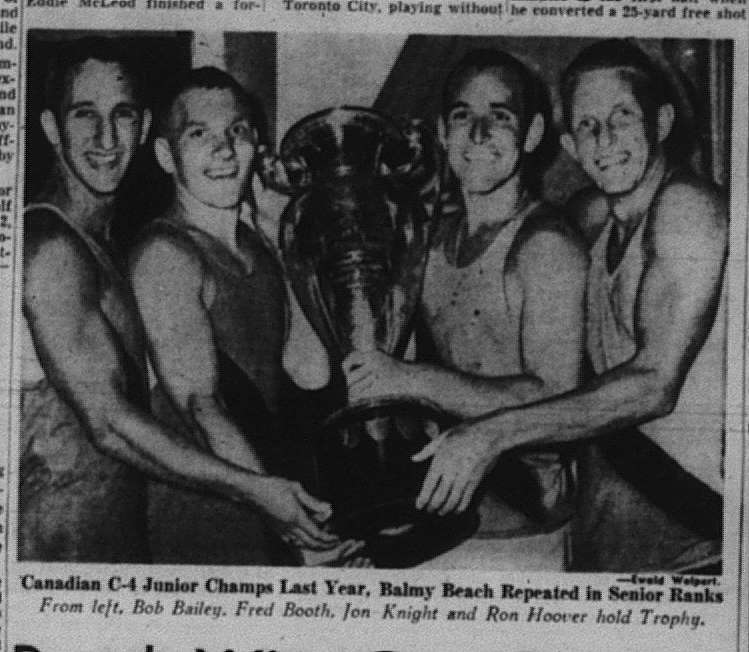 |
||||
| Time |
Club |
Crew |
||
| 1959 | No
Time |
Lachine |
Barry
Wright, Gordie Hill, Allan More, René Pilon |
|
| Ottawa |
Rene “Birdie” Pilon, a very inexperienced paddler; had just come up through the ranks of Lachine’s number two war canoe crew affectionately, or not, known as the “Garbage” crew. Alan More, the nice guy; always dressed to impress; had never won anything in canoeing but was a great hockey player and a good all-round athlete. Gordie Hill, the total package; a charming character; a proven winner with two Juvenile gold medals already to his credit; a loosey-goosey type of guy with a natural knack to make people laugh; good at anything he put his mind to. Barry Wright (me), a total technocrat who pursued the perfect style; had stroked the Canadian champion Juvenile War canoe in 1957; self proclaimed as very uptight guy who always wanted to play by the rules. The Journey – Summer of 1959 Our crew was not uptight as were many of our fellow club-mates and competitors. We chose to have fun while spending our summer as paddlers. Our workouts mostly consisted of sprinting and due to the hard driving personality of the sternman Rene Pilon, Gordie Hill would often tell Rene that he was driving him crazy. Gordie would then whisper to me (“Barry … lets go overboard”) and Gord and I would jump out of the boat to have a swim along the rock pile. Alan More would get all upset in us losing our focus and Rene (we called him "PEA CRACKER") would give us hell and then once we were back on board, he would carry on with the sprint intervals accentuating the pace with his ear piercing, wolf whistling (his "BIRDIE" thing). Our crew in general had a very high stroke rate which helped to keep the bow from bobbing like so many do. We spent much time on positioning of our weight in our boat to make it run smooth. Alan More and I on the left were much bigger than Gord and the Peas Cracker. We tried various C-4 boats at our club and found only one that fit us well. On regatta days, we would all gather only at race time. We never seemed to mix before the race went to the line. Perhaps Gordie and I hung out a bit but we were not in each other’s lap. We went into the “Dominions” having lost only one race! That loss coming in Trois Rivières, Quebec as the boat suddenly ran at right angles in the swift current at the finish line. A wide-open lead was lost and a lesson was perhaps learned. The Dominions, Hogs Back Mooneys Bay – early August We drew course 13, the far outside. All lanes were full. Thirteen crews there to contest the Trophy. As we went down to the starting line, we were confident that we were the best but as we took our lane, the waves and the wind and all hell broke loose. “Birdie” Pilon gave his CHIRP, said he thought we had better sprint at each set of buoys (every 125M in those days, I believe). He said we had to get out of the wind and bad water as we were way on the outside, unprotected. I think by the first set of markers we had run in at least three lanes and by the 500m mark I think we had wandered into course 5. This bothered me (the play-by-the-rules guy). I could hear referees yelling at us. I did not want to be disqualified as had happened in recent years with a couple of our great LRCC heroes, Doc Whittall and Don Rose. I felt we could win going straight ahead. And we did win the race … on course 3 or 4. We were almost at the dock when the second place crew crossed the finish line. We had carried out the game plan and sprinted at every set of "CANS" (known as lane markers today). Gordie and I had stroked the Juvenile War Canoe winners two years earlier; we had followed that up by coming 1st and 2nd in Juvenile fours in 1958 and on that same day came within heart breaking inches of repeating as Juvenile War canoe champs. But here we were in 1959, atop the podium once again. Looking back I sum up: we were just four paddlers, enjoying the thrills of racing. We were never uptight and were full of laughs. I sometimes wonder if we were last of the breed! Things changed shortly after. Rene Pilon, from winning that Black Trophy, would go on to win Junior C-1 two years later and by 1963 would make the National team and compete in C-1 at the World championships in Germany. He would also leave his job as a riveter at Canadair and go back to school eventually earning his Masters degree in Physical Education. Alan More would go on to a stellar business career with Alcan. He would also become a very well-respected Commodore of the Lachine Racing Canoe Club and while in that position he would be viewed as a mentor to some of the youth at that club. Alan would later become Commodore of CCA. Barry Wright - I suffered a horrible bout of tonsillitis the next year and missed the early-season workouts. I was so sick my energy was sapped. Then I had a great job opportunity at Air Canada in their engineering department; a job to work on a special project with the Vice President of Air Canada. It entailed twelve-hour days for over a month. I did that job every spring while I worked at Air Canada and that put an end to my competitiveness as paddler. Life was calling. I would become a referee in paddling and officiated as such at Presidents Cup Regatta and North American Championship in Washington, D.C. I always felt the only reason I took the job was that I flew for free. Still being that seeker of fun as I was while a paddling youth, I would go on to perform as “Doodles the Clown” for decades as an adult. Gord Hill had one more national championship to win: Junior C-2 a few years later. He then got married, started a family and earned his pilot’s license. Gord went on to become a pilot with Air Canada. Sadly he was on board, flying third seat on a DC-8 that crashed in Toronto in 1969. His was the saddest of funerals. I had obtained a job application at Air Canada for my friend and crewmate, Gordie Hill. |
|||
Barry
Wright |
||||
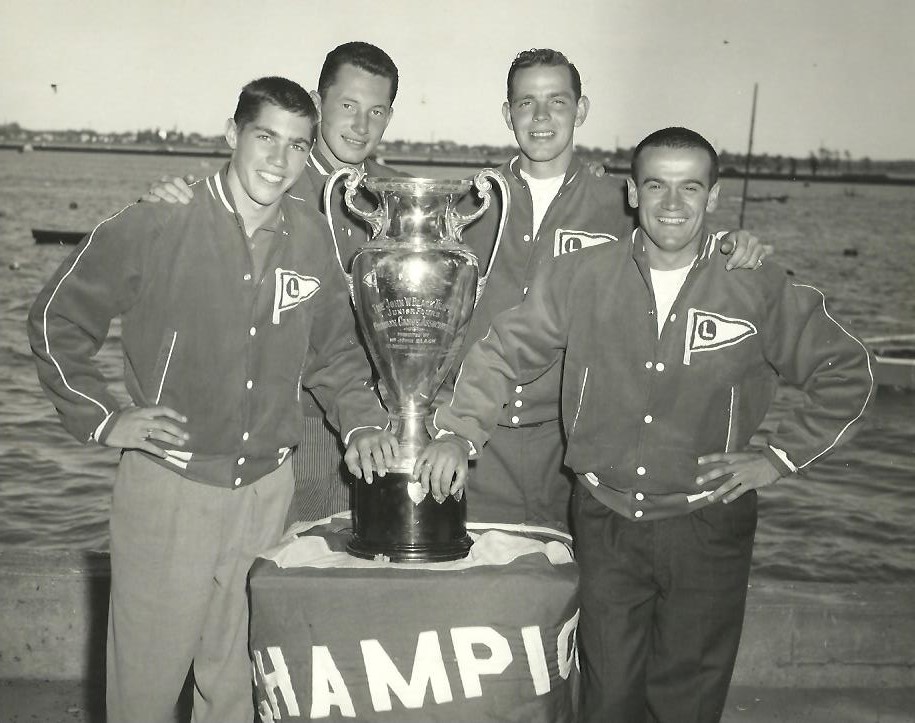 |
||||
| Time |
Club |
Crew |
||
| 1958 | 4:56 |
Cartierville |
Bill
Line, Ralph Benson, Bobby Jort, Alec Pascal |
|
| Ottawa |
|
|||
Best
Time |
||||
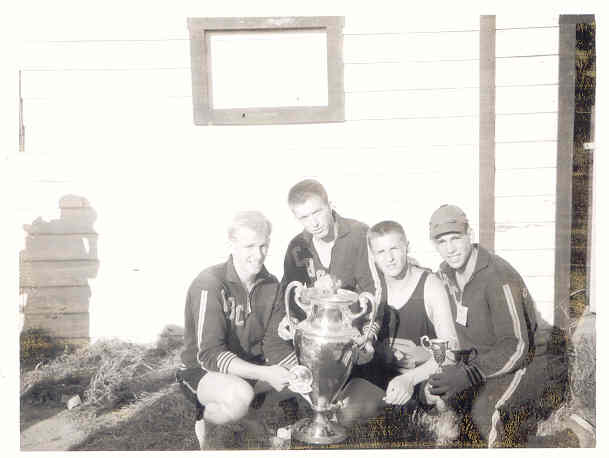 |
||||
| Time |
Club |
Crew |
||
| 1957 | 4:57 |
Sudbury |
John
Beedell, Joe Derochie, Fred Johnston, Doug McMorran |
|
| Ottawa |
|
|||
Best
Time |
||||
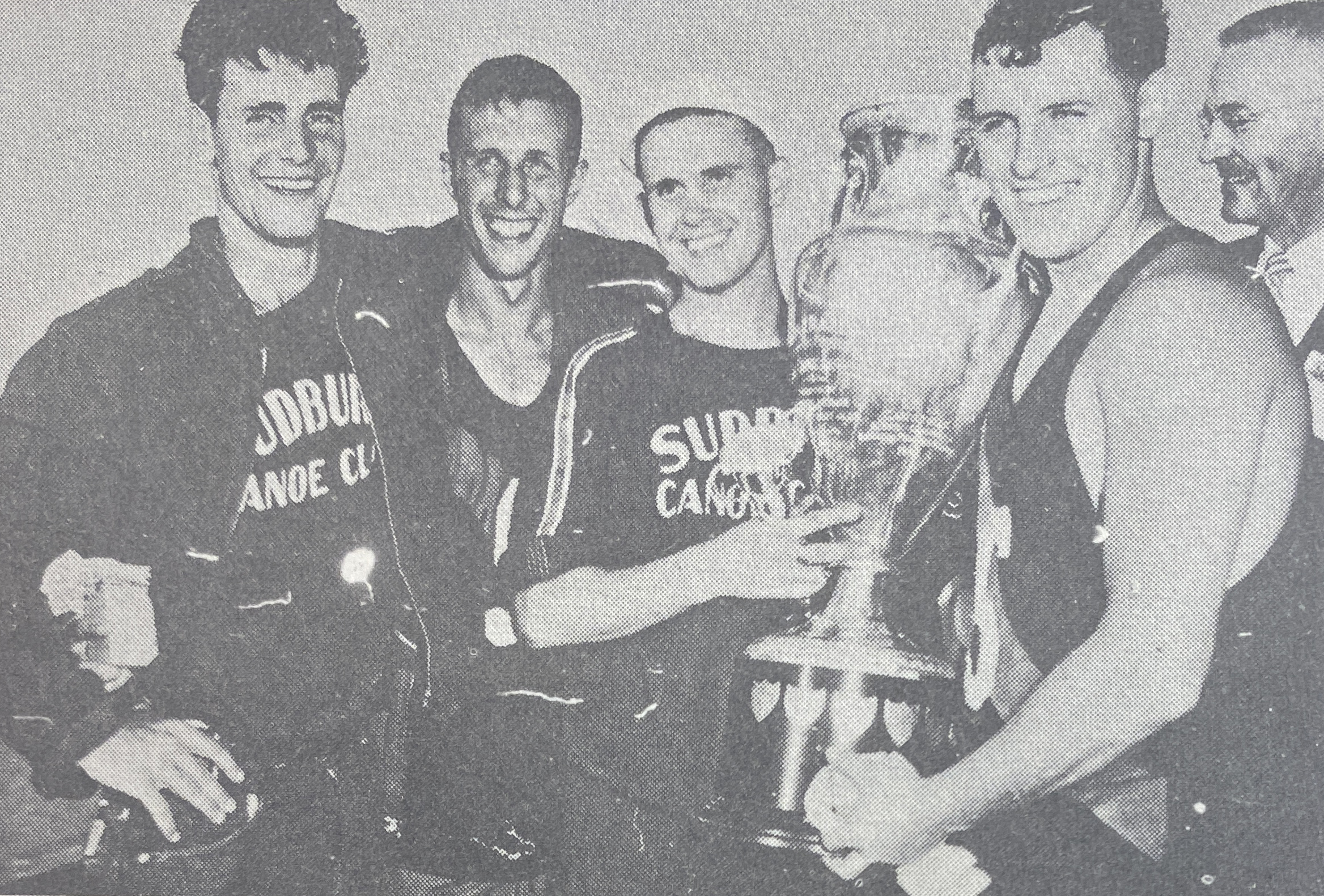 |
||||
| Time |
Club |
Crew |
||
| 1956 | 4:57.2 |
Mic
Mac |
Jack
Flinn, Lawrence Murphy, Dietrich Schroeder, Henry Mosher |
|
| Ottawa |
1956. The Maritime Division of the Canadian Canoe Association consisted of two clubs - Banook and Mic Mac. The revolutionary new “Peanut “racing canoes were only a few years old. No one raced in kayaks. No local paddler had previously competed at a National Championship except Henry Mosher, who was the current single canoe champ on our lakes at that time. Interclub races started each year on July 1st culminating in the local championship on Dartmouth Natal Day early August. Division Flag Officer, Bill Patterson, announced that a local contingency was going to the “Nationals” in Ottawa but first we had to qualify. Crews were formed and fund raising started. Our C-4 crew from Mic Mac consisted of Henry Mosher, Lawrence Murphy, Jack Flinn and myself (Dieter Schroeder). Lawrence and Jack were the reigning C-2 champs on the lake then. Jack was the stroke; I steered with Henry and Lawrence providing the power. We were to race in the Junior C-4. The qualifying regatta was something totally new to us and we were told only the winners would be going. Our main competition came from within our own Mic Mac Club, consisting of Donnie and Billy Graham, Erin Dockrill and Lloyd Brown and since we just barely beat them in that race, it was decided to send both crews. We set off with great fanfare one early morning in July from the seawall on Lake Banook, a caravan of approximately six cars, boats on top, bound for Ottawa. Few of us had ever been outside Nova Scotia. Two days later, tired from sleeping in tents and crowded in cars without air conditioning we arrived at the race course. It was crowded with boats and athletes, a beehive of activity unlike what we were used to. We were greeted warmly by all officials and participants we met; they seemed truly glad to have us come all this way to compete with them. We soon learned who the top clubs in the canoeing game were: Lachine, Cartierville, Balmy Beach, Toronto Island, names we’ve never heard before. But then again, no one had heard of Banook or Mic Mac either. Our club did not do particularly well; as the National Regatta went on expectations of any successes diminished as the day wore on. These guys were good! The competition between the big clubs was fierce. But the Junior C-4 race was yet to come. We had lane #1, the other Mic Mac crew was in a centre lane. I recall a lot of jockeying at the starting line along with much taunting between crews. The start was disastrous for us, we got the wash of lane #2 boat immediately, we were finished ... then there was a gunshot indicating there was a foul and the referee asked all boats to re-start. This time we got off the line much better, battling it out with lane #2 for some distance and then ... another gun, another foul and another re-start. Third time lucky - our start was great and we soon had open water ahead of us. Half way home we were up with crews in the middle lane and far over. Down the stretch all these boats had faded except for one from the far side and even though we were 10 lanes apart at the start, now only about 2 lanes separated us. Both crews had drifted towards the centre of the course. We went on to win the race by the slightest of margin. The 2 boat collided after the finish line with their bow leaving a mark on the gunwale half way along our boat. We learned later that this crew was from Sudbury. Back home we were treated like heroes, write–ups in the local sports page, meeting the Mayor, being part of a parade with our big Black Trophy. This was the first ever national canoe championship race won by a maritime crew. Today, 55 years later, this race is still being run in the same type of boat and it is one of my favourite races to watch. In 2006 the Atlantic Canoe Association commemorated the 50th anniversary of our historic win by inviting Lawrence, Jack and me to be guests at a Division Regatta. Missing was our team mate, Henry Mosher, who had passed away some time ago. It was great getting together with Jack and Laurence and what a time we had looking back, rehashing our race many times over. Jack delights in taking the opportunity to remind Laurence and me that he claims the major credit for the win ... after all, it was all in the way he stroked, right? With thanks to Bill Patterson! |
|||
Best
Time |
||||
Dieter
Schroeder |
||||
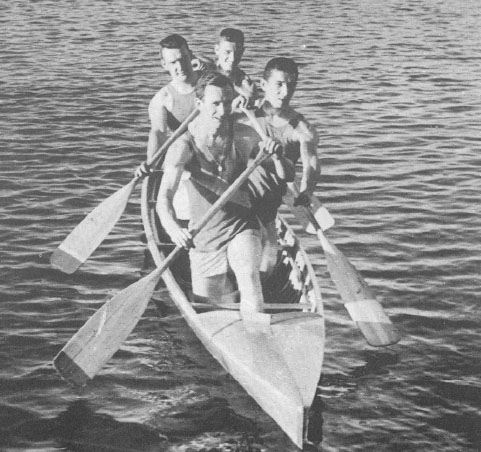 |
||||
| 1956: Race distance changed from 1/2 Mile to 1000m | ||||
| Time |
Club |
Crew |
||
| 1955 | 3:34.4 |
Balmy
Beach |
Ken
Bingham, Willard Russell, Noel Thomas, Tom Redwood |
|
| Ottawa |
Two Balmy Beach crews in this race: Lane #1 (Russ Dunn, Bill Voss, Don Oliver Joe Green) and Lane #3 (Noel Thomas, Tom Redwood, Willard Russell, Ken Bingham). Eight Junior C-4 Beach paddlers had raced the ½ mile war canoe; two others had won the Junior C-2. The Junior C-4 will be the third and last race of the day. The Beach crews paddled 9/10ths of the race and Otterburn came over from Lane #8 and was crossing in front of Beach’s Lane #3 crew (who were in their own lane). A few sprint strokes caught and hit the boat and the race was stopped. Otterburn were disqualified and the race would be re-run. This was going to take considerable time as the next race (Senior K-2) was on the starting line and it was decided to run this race. Lachine won and were 8 points ahead in the regatta with only two races left. The two Beach crews were given time to get back to the starting line for the re-run. Beach (Lane #3) won the race with Beach Lane #1 beating Lachine for second place. Lachine was now ahead by one point with one race to go. The last race is the one-mile with Beach in Lane #2 and Lachine in Lane #1. Beach was leading by ½ a length when Lachine ran into them and the race was stopped. Lachine’s coxswain claimed that his buoy was sunk. Mossman agreed to let them back in the race not wanting to win this CCA burgee on a disqualification. Beach wins the re-race by a boat length and the burgee by one point. |
|||
Ken
Bingham |
||||
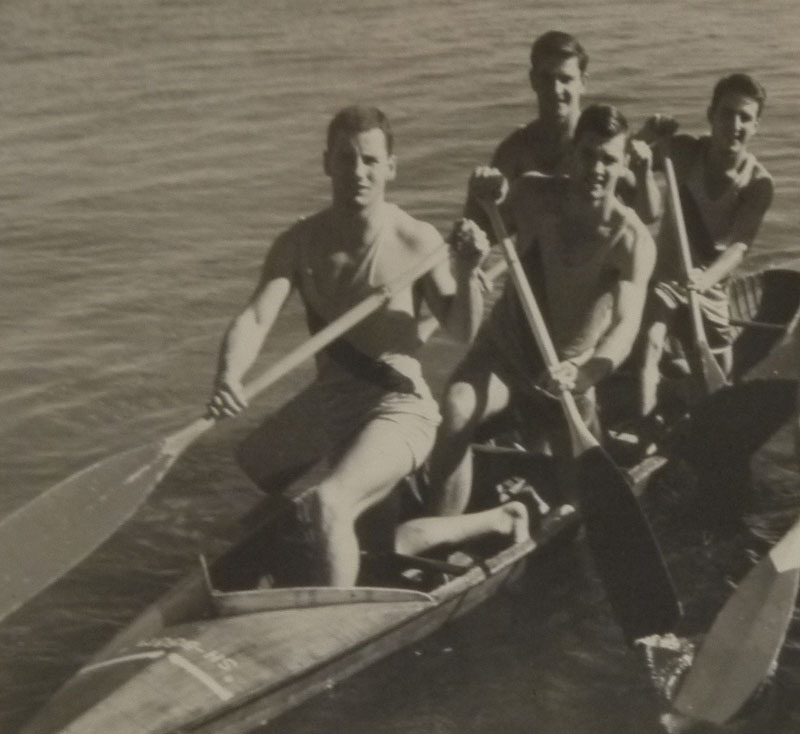 Editor’s note: Balmy Beach also won the E. R. Reilly Trophy (Juvenile) aka The Baby Black |
||||
| Time |
Club |
Crew |
||
| 1954 | 4:03.8 |
Island |
Art
Dierden, Gus Lamantia, Jack Hayward, Paul Lambert |
|
| Ottawa |
This
crew won every race that year including the Senior C-4 and North
American Senior C-4 and became known as "The Island Four
from ‘54". |
|||
Art
Dierden |
||||
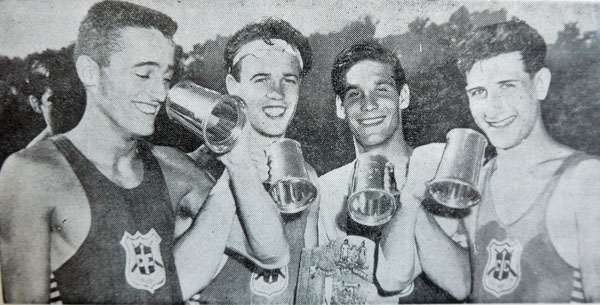 |
||||
| Time |
Club |
Crew |
||
| 1953 | 3:57.6 |
Chateauguay |
Jake
Hamilton, B. Brady, Don Duffey, J. Lalumiere |
|
| Ottawa |
|
|||
| Time |
Club |
Crew |
||
| 1952 | 3:33.2 |
Balmy
Beach |
Dave
Thomas, Gord White, Anthony Manis, Harry Daffern |
|
| Ottawa |
|
|||
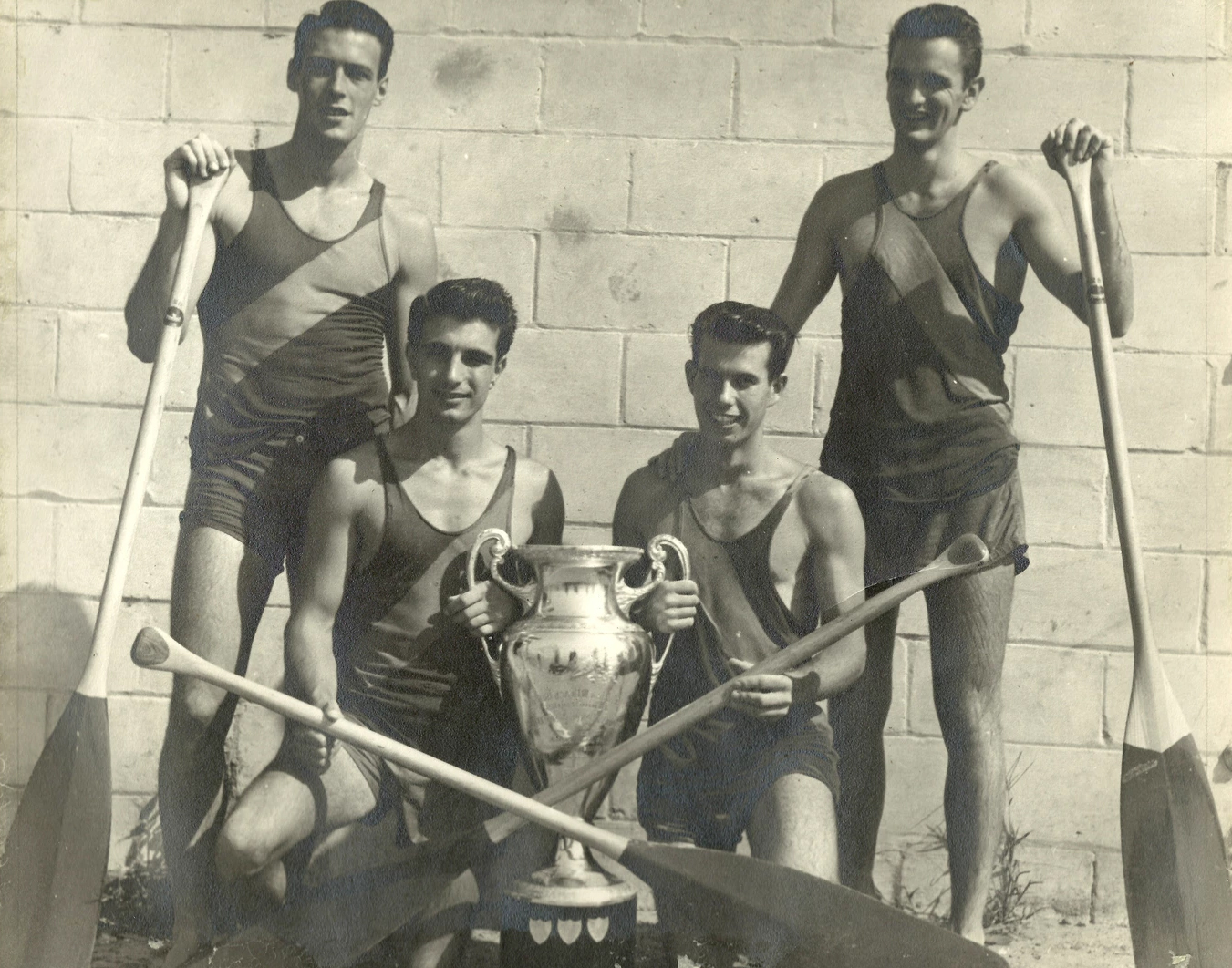 |
||||
| Time |
Club |
Crew |
||
| 1951 | 3:53 |
Chateauguay |
J.
Clayton, Eddie Smith, Paul Duffey, J. Braid (Beard?) |
|
| Ottawa |
|
|||
| Time |
Club |
Crew |
||
| 1950 | 3:46.6 |
Radisson |
Roger
Bellefeuille, Maurice Dubois, Marcel Paquette, Dennis Aubry |
|
| Ottawa |
|
|||
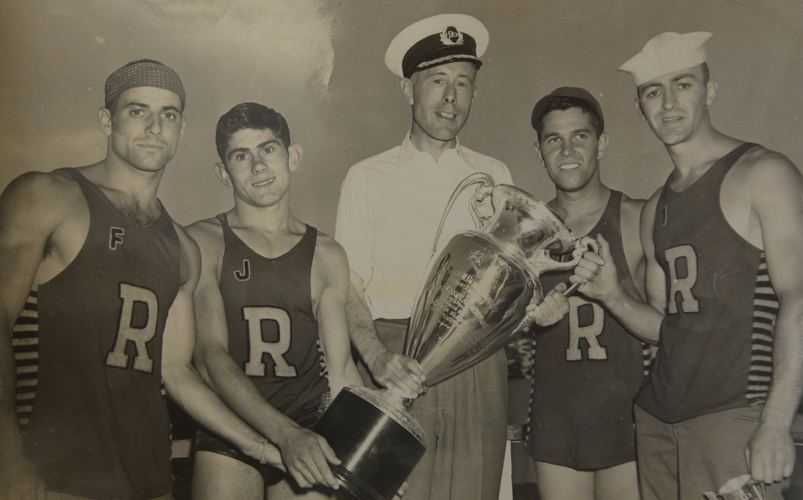 Editor’s note: Radisson also won the E. R. Reilly Trophy (Juvenile) aka The Baby Black |
||||
| Time |
Club |
Crew |
||
| 1949 | 3:42.1 |
Grand
Trunk |
G.
Owen, J. White, Hank McDerment, Alan McCleery |
|
| Ottawa |
|
|||
| Time |
Club |
Crew |
||
| 1948 | No
Time |
Cartierville |
Graham
Campbell, Rob Sleeth Sr. Brian Gregor-Pearse, Ted Kenney |
|
| Ottawa |
|
|||
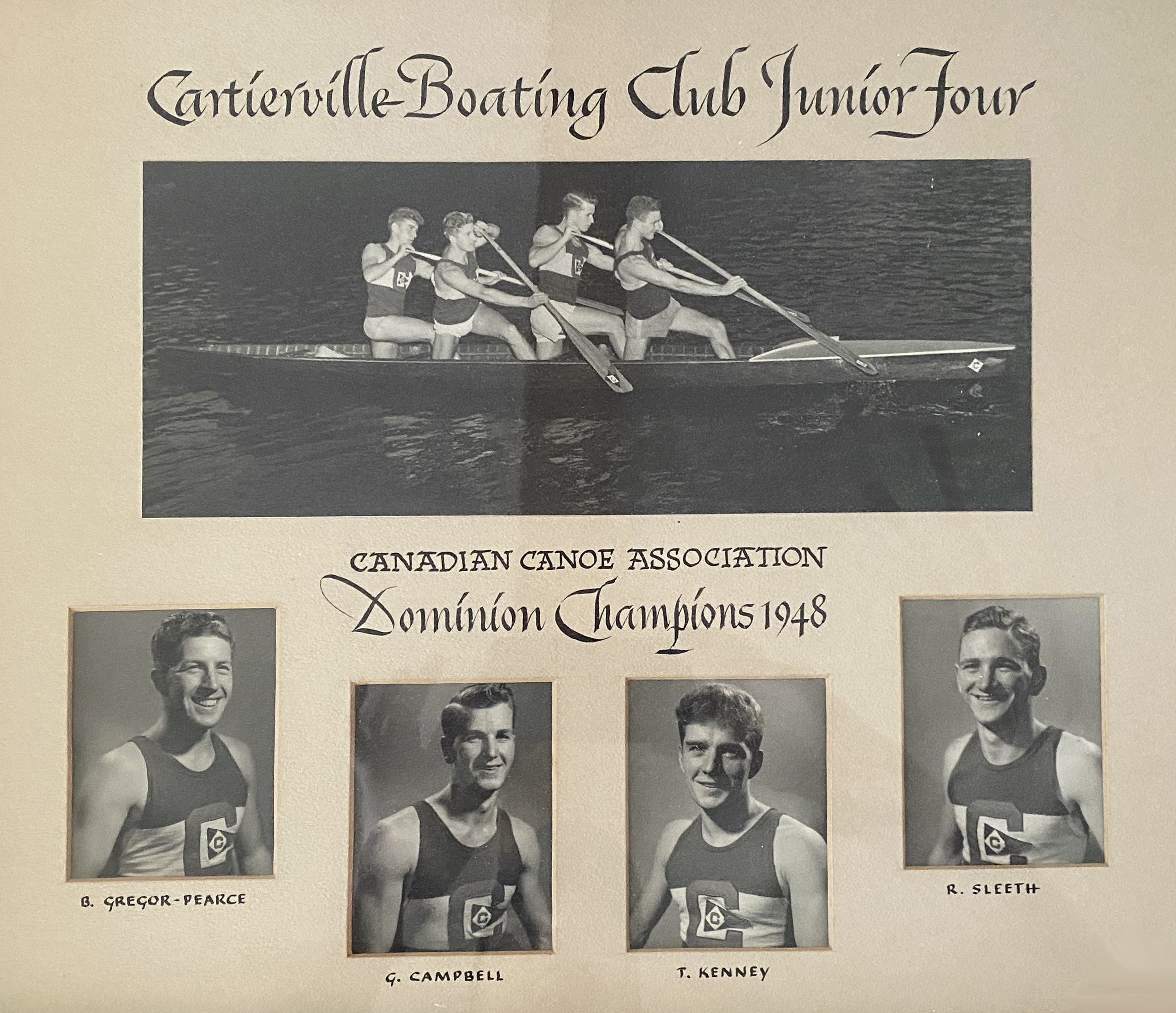 |
||||
| Time |
Club |
Crew |
||
| 1947 | 3:30 |
Excel |
George
Gariepy, C. Grenier, J. Berry, J. Dever |
|
| Ottawa |
|
|||
| Time |
Club |
Crew |
||
| 1946 | 3:20 |
Toronto
Sailing |
C.
Bradford, Stan Richardson, J. Harrison, E. Gray |
|
| Otterburn
Park |
|
|||
| 1942-1945 - Race Suspended (WWII) | ||||
| Time |
Club |
Crew |
||
| 1941 | No
Time |
Island |
Tom
Hodgson, Joe Plunkett, Art Porteous, Eddie Rudd |
|
| Ottawa |
|
|||
| Time |
Club |
Crew |
||
| 1940 | 3:25 |
Island |
Bert
Oldershaw, Bill Stevenson, Chuck Johnson, George Collins |
|
| St.
John's, QC |
|
|||
| Time |
Club |
Crew |
||
| 1939 | 3:36.6 |
Excel |
Harald
Poulton, Doug Creighton, Jackson, Wilson |
|
| St.
Catharine's |
|
|||
| Time |
Club |
Crew |
||
| 1938 | 3:44.8 |
Grand
Trunk |
Bob
McCreight, Mario Crete, A. Turnbull, Vernon Blake |
|
| Kingston |
|
|||
| Time |
Club |
Crew |
||
| 1937 | 3:19.8 |
St.
Lambert |
Harald
Poulton (2nd
win; 1935),
Donie
Hall, Earl Norman, Arnold Norman |
|
| Montreal |
|
|||
| Time |
Club |
Crew |
||
| 1936 | No
Time |
Rideau |
Harry
Bourassa, Ken Stroulger, Johnny McTeer, Jim Chambers |
|
| Sudbury |
|
|||
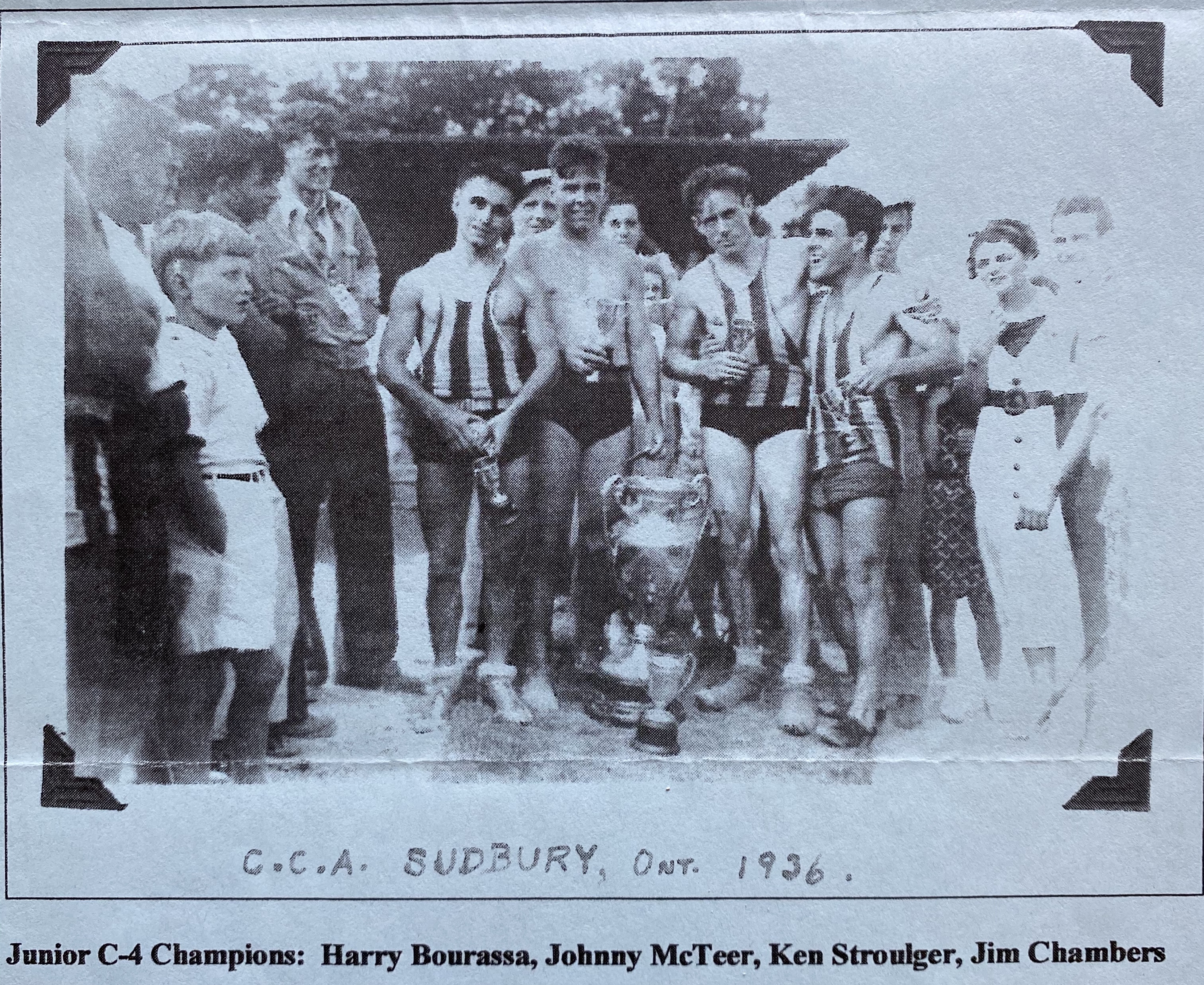 |
||||
| Time |
Club |
Crew |
||
| 1935 | 3:45 |
Balmy
Beach |
Jack
Wachter, Jack Frizelle, George Barclay, G. Powell |
|
| Ottawa |
|
|||
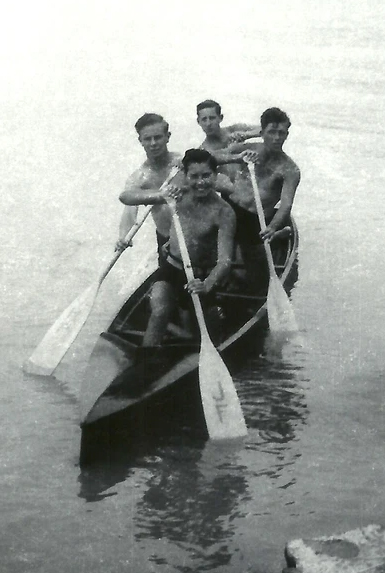 |
||||
| Time |
Club |
Crew |
||
| 1934 | 3:40 |
Sudbury |
Ray
Scott, G. Lane, O. Boucher, A. Eldridge |
|
| Lachine |
|
|||
| Time |
Club |
Crew |
||
| 1933 | 3:17.8 |
Gananoque |
Ray
Delaney, H. Gerrard, R. O'Connor, Earle Mathews |
|
| St.
Catharine's |
|
|||
| Archived
Record |
||||
| Time |
Club |
Crew |
||
| 1932 | 3:54.4 |
Gananoque |
Vincent
Dier, Gordon Douglas, H. Cartwright, F. Littlejohn |
|
| Ottawa |
|
|||
 |
||||
| Time |
Club |
Crew |
||
| 1931 | 3:25.6 |
Otterburn |
Charlie
Strike, J. Ferguson, Fern Ledoux, Ralph Robertson |
|
| St.
John's, QC |
|
|||
Best
Time |
||||
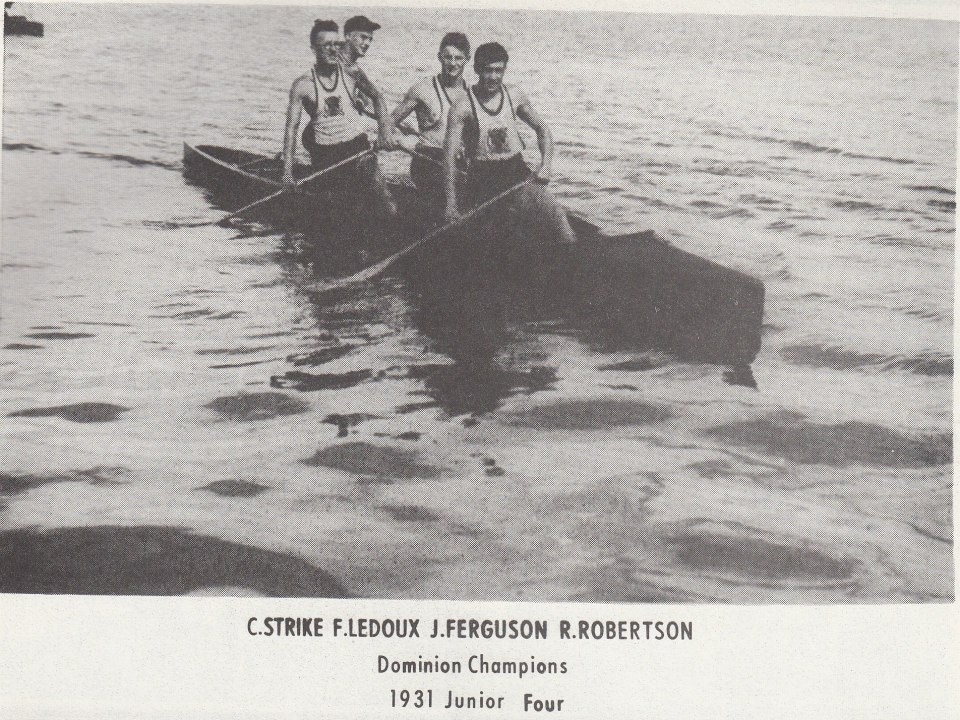 |
||||
| Time |
Club |
Crew |
||
| 1930 | 3:53.8 |
St.
Lambert |
H.
O'Neill, D. Barklay, Ed McGregor, R. Jardine |
|
| Hamilton |
|
|||
| Time |
Club |
Crew |
||
| 1929 | 3:50.4 |
Gananoque |
Ray
Hawke, E. Potter, Noah Gauthier, L. Cooke |
|
| Carleton
Place |
|
|||
| Time |
Club |
Crew |
||
| 1928 | 3:33 |
St.
Rose |
Gordon
Staten, Chris Pope, T. Waite, W. Howard |
|
Lachine |
The following is from the Ottawa Citizen August 7,1928. "A well-deserved victory in the junior fours was scored by the St. Rose Club of the Eastern Division. This club has but 6 paddling members, four of them being placed in their only shell for Saturday's Dominion championship event. The shell was originally used in Canada title races in 1902, and at present is somewhat worse for wear. The four youngsters from St. Rose were conceded little or no chance of even figuring among the first three. They fooled the wise ones, however, and coasted home easy winners, their smooth and powerful stroking, giving them a four-length advantage at the finish line. Time 3:33, Gananoque was 2nd, while Parkdale came home in third." There is a bit of discrepancy in this article from the Ottawa Journal August 6, 1928. "One of the biggest surprises was the victory of the youthful St. Rose crew in the junior fours. With only a handful of paddlers to draw from and competing in a borrowed boat, the young fellows crowned themselves with glory when they finished first and became the initial holders of the magnificent Black Trophy." My dad was a humble man and he didn't brag about his accomplishments. He was an incredible natural athlete and excelled in any sport he participated in. Our mom told us that our dad had won Dominion championships in paddling, swimming and diving. It was only through old photos that my niece discovered the connection between the John Black Trophy. I have a huge collection of trophies, but most of them just say the place won in the race and not the event. My dad had another considerable collection of medals mostly from his diving accomplishments. As happened on more than one occasion when my parents were elderly, someone showed an immense interest in my parents' possessions. A receptionist at a doctor's office said she collected medals and my flattered dad gave her all of his. We were heartbroken when my brother approached this woman to try and retrieve these family treasures; she said she gave them away. My parents moved to 50th Avenue in Lachine, Quebec, in 1950 and still lived there when they died. My dad was a few weeks shy of 94 and my mom was 92. An unusual coincidence is that two subsequent winners of the John Black Trophy from the Lachine club lived on the next street to us. Barry Wright was part of the 1959 crew and Alan Wright, his brother, was part of the 1965 winning team. Alan and I went all through school together. |
|||
Barbara
Pope Daughter to Chris Pope |
||||
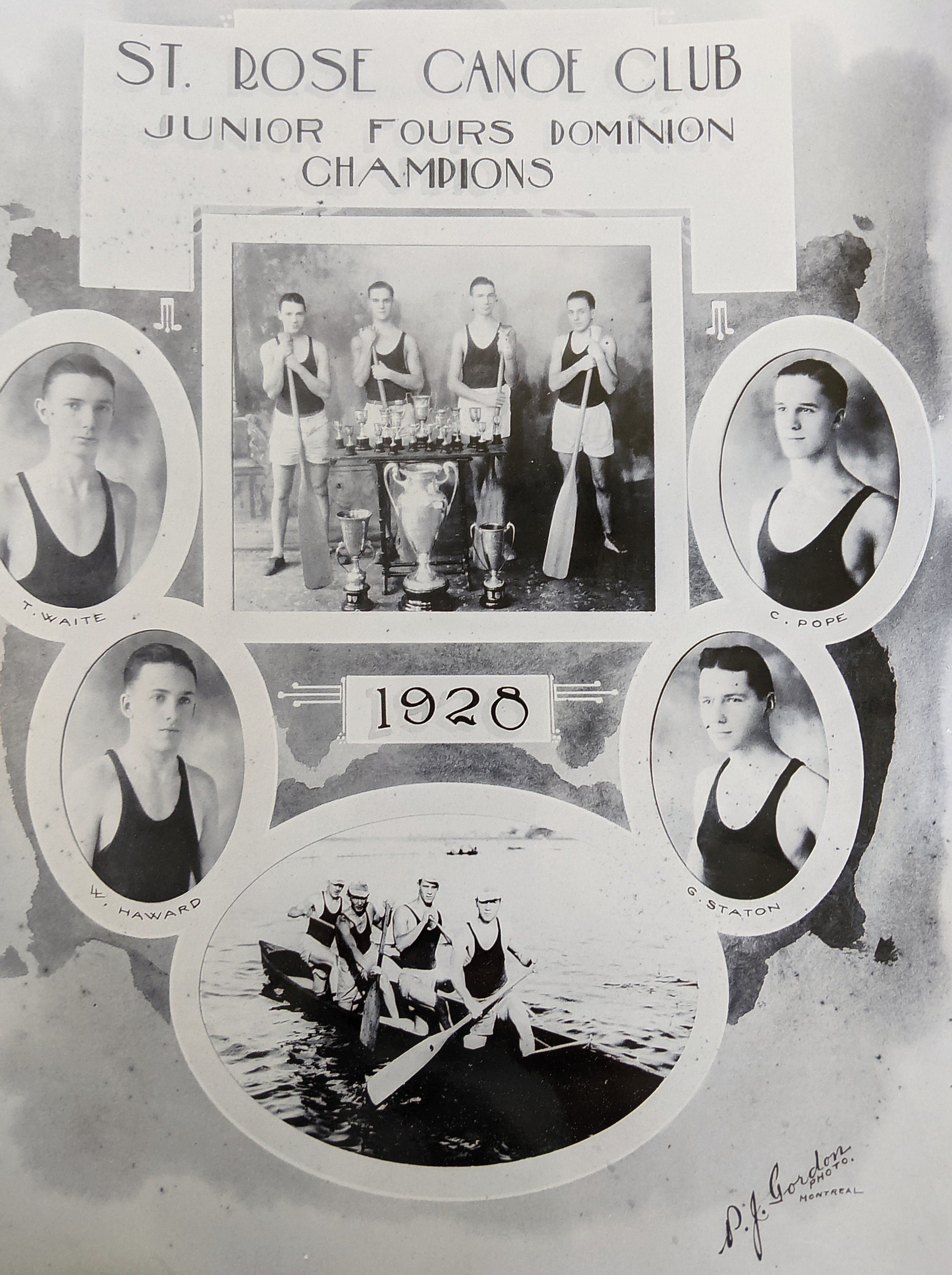 |
||||
| Time |
Club |
Crew |
||
| 1922 | 3:54 |
Humber
Bay |
Art
Orr, Reginald Priestly, Joe Tiveron, George Crevier |
|
Montreal |
A little information regarding Orr, Crevier, Tiveron
and my grandfather, Reginald Priestly from 1922. They won Junior,
Intermediate and Senior all in one day for Humber Bay Canoe Club
but it was also in doubles, quads and war canoe according to our
family records. Here is their “Dominion Champions - Junior,
Intermediate, Senior” paddling photo from 1922. Sorry it’s
a little grainy but it’s a photo of a photo mounted under
glass that is enlarged to about 20” x 36” so I cannot
copy the original print. From left to right are: Orr, Crevier,
Tiveron and Priestly. My grandfather went on to wrestling and
won several Canadian titles and eventually made it onto the Canadian
Wrestling Team for the 1928 Olympics in Amsterdam. In 1930 he
won gold in welterweight wrestling at the British Empire Games.
I have his medals. |
|||
Andrew
Barcham Grandson to Reginald Priestly |
||||
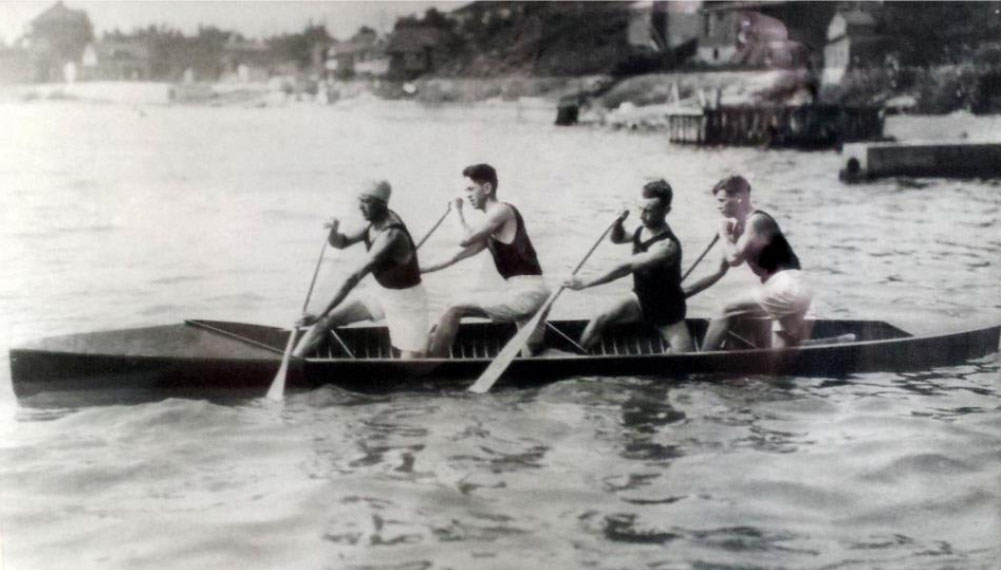 |
||||
